#yes its first world problems vs third world problems
Explore tagged Tumblr posts
Text
Mark... Gut punches are illegal from your page.




#they both escaped home but for different reasons#yes Luz has a loving mother but from her perspective she was being forced in a very bad box#Luz escaped because she couldn't live there with her mother anymore#her mother took the opportunity to change though#Vee never had anything#she was exploited or hunted because she is a basilisk#any home was better than no home#yet she still manages to open up#yes its first world problems vs third world problems#but both need addressing#this was sweet#moringmark#the owl house#toh#luz#luz noceda#luz toh#toh luz#luz the owl house#luz the human#vee toh#vee the owl house
22K notes
·
View notes
Note
I love Amara! I'm dying to know how she'd (as a character that struggles with being more than a killer/tool and experiences new emotions and roles on earth) views grey morality especially after the Mark vs Cecil argument?
Does she feel a connection to Cecil's views on defending earth by any means necessary even if it makes you cut throat? Does she even know it happens?
Also curious to know who she met on earth first? Did Mark get sent up to intercede before she landed? Or did Cecil transport himself to her landing site like he did with Nolan?
Also her hair cut??? Iconic
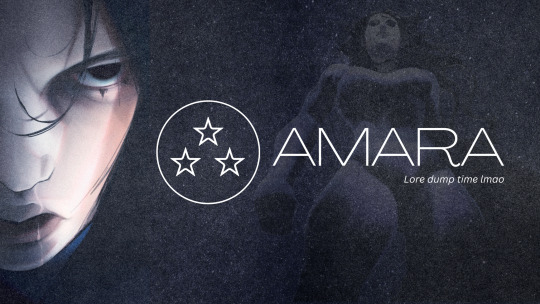
Okay, first off, I'm actually so grateful you love her?? Like?? My little Shayla is interesting to other people??? THANK YOU?? I'm so touched i'm like jumping in my seat ok ok, serious time.
Okay, a little context before I answer the actual question:
Amara, despite having the conscience to leave the empire, is essentially an empty cup.
She left at 19 when her chance to discover the universe—enslaving a planet of her own—was offered to her. As a result, she has less knowledge of the universe and its workings than her peers, who have spent long periods up close and intimate with other civilizations.
Yes, she has committed atrocities on several different worlds, but hasn't had the chance to know what an actual culture is or how people operate. Her training was purely kill, then leave. So you can say that up until she actually left, she's so fucking blind.
Also, she is the third youngest Viltrumite (twinning w Mark and Oliver.) so the knowledge gap is just... very large.
Imagine being raised in a horrible place, learning horrible things, with horrible people, having nobody your age around you, and nobody to have a real, meaningful conversation with.
The only reason she hasn't turned out like the rest is the only actual relationship that has ever mattered to her until her defection to the Coalition of Planets-- her mother.
Her mother haunts Amara's narrative. Her Debbie. The only reason Amara isn't an actual monster. (The Mark and Amara bond in my universe goes so fucking crazy and I will unpack that one day.) The only kind face, the only embrace, the only proof of joy and tenderness and love. That proof was enough for Amara to weather the storm.
Her desire for vengeance can only extend her knowledge so far.
That being said, authority figures are something so familiar to her.
She was raised as a thing-- they point and she shoots. There is a sad comfort she finds as a tool. She cannot shake that. She is aware her entire mindset and life experience is a problem, but pointing out each individual thing and analyzing what is wrong or right she cannot do. She is in limbo.
Now, that she is under Thaddeus' command, and Thaddeus is working against Viltrum, his wants and desires become her own. if he points at Earth and says go make nice with Earth and teach Mark how to fight, she will do both to the best of her ability.
When she arrives (Between Season 2 and 3) she is still within this mindset, and has not had enough life experience to form her own solid opinion. Therefore, she falls back on her orders.
You are an emissary. Appease the leaders of Earth. Strengthen its ties to the Coalition.
You need to ready Mark for war.
I think she would not even be focusing on the essence of the conflict at this time. She would be playing meditator as best as she can. She is not going to condemn Cecil, that would not appease him. She is not going to stop Mark, she needs him.
I think she would definitely try and stop the whole Mark and Cecil confrontation because it would but a hindrance on the mission, but deep down, her baby conscience is starting to try and ponder on why these men are acting the way they are.
Aren't they on the same side?
Oh Mar Mar, being introduced to individuality and differing mindsets. One day, you will understand.
Also! She Meets Mark first! Thaddeus makes the mistake of letting Allen take charge in directing her where to go, and how to go about introducing herself-- the man who can barely read. He also doesn't know that she is a Viltrumite, and the GDA has definitely set up bio scanners to see if any enter the atmosphere.
Cue, I'm entering the atmosphere, let me look at my watch to see where I'm going, oh, someone is literally gunning it toward me and isn't stopping, okay It looks like I'm going to be attacked.
They have a skirmish. Mark doesn't let up until Amara mentions Allen's name, cause she's a smart cookie. Mark has to call off the hammer being brought down. Then, she meets Cecil and is shoved in a huge ass van with the biggest fucking convoy following behind.
Hooray!
AND HER HAIR! Oh everyone loves her hair. I am so glad for it because it is like, my favorite feature of hers-- that and her boba eyes.
I love u :<
#I'm sorry i wrote a fucking novel#I had so much fun yapping thank you I love you#Amara#bee's ocs#invincible oc#invincible original character#viltrumite oc#viltrumite original character#oc lore#Amara lore
48 notes
·
View notes
Text
146. Rick and Morty vs Dungeons and Dragons

Owned: No, library Page count: 240 My summary: Rick and Morty meets Dungeons and Dragons in this series of stories from the world of DMs and dice rolling! Morty wants to learn more about D&D to impress a girl - but Rick takes his interest too far. Rick investigates the sudden D&D mania that grips the world. And what would happen if a Mister Meeseeks got into D&D? My rating: 4/5 My commentary:
I like Rick and Morty. Controversial opinion I know, particularly with the reputation that its fanbase has, but there's genuinely a lot of really good storytelling going on in the show. When it's at its worst, sure, it's juvenile and gross, but when it's at its best it can be touching, thought-provoking, and incredibly intelligent. We got this very handsome hardback of three official D&D tie in stories at work, and so of course I was going to dip into it. The first story I'd actually already read, but the second and third were new to me, and the whole thing was a delight! It was a much deeper experience than I was expecting, and I was very pleased with it.
The first story comes when Morty, seeing his peers getting into D&D and specifically D&D podcasts, wants to start playing to impress a girl. Rick gets far too into it, and eventually plunges the whole family into a D&D world where they are in actual peril, risking both their lives and his relationships with them. This was a lot more thoughtful than I assumed it would be. It's an official tie-in comic, it's shameless promo, but there's so much character depth and introspection going on here. There's a line drawn between Rick, a minmaxer who wants to create characters with the best builds, and Jerry, not all that good at the numbers side of the game but willing to stick himself more into roleplaying and into the fiction of the world. It's showing two of the different approaches to tabletop games, yes, but it's also providing a great deal of character work. Rick is misanthropic, he's a problem player, he's sulky and annoying because he's not the best character in the world and people aren't hanging on his every word. Meanwhile Jerry, with a Charisma boost from his character, can be a much better leader of the family and the party, and understands implicitly what's going on with Rick and the underlying dynamics of their family. It's a really good read!
Our second story is something of a follow-on - suddenly, the world is D&D obsessed, and only Rick realises something's fishy. A bit of investigation shows that an alternate world inhabited by Rick's discarded D&D characters is leeching through into the real world, and it's up to him and Morty to try and stop it. Once again, we've got character development for Rick, as we see his toxic tendency to abandon his 'toys' when they're no longer interesting to him, with disastrous results when those 'toys' are people and those people resent him. Rick winds up alone for a long time, fighting and battling through all of these discarded Ricks in order to finally topple them, figuratively and literally destroying evil parts of himself. What a fucked up little man.
The Meeseeks story is more throwaway and just for fun. A pair of adventurers find a Meeseeks box and tasks the Meeseeks to get one of them a kingdom, before they both accidentally die. Meeseeks is left to fulfill his purpose by summoning more Meeseeks to create an adventuring empire, conquer a kingdom in the name of the adventure, and finally disappear. It's a fun, silly story, with lots of classic Rick and Morty humour, and I very much enjoyed it.
Next, back to CHERUB, as James and Lauren undertake their most dangerous missions yet.
1 note
·
View note
Text
First, I want to dig into that 90% figure, because I think there's a distinction to draw between the people who merely responded to a poll checking the "YES, I support Israel" box vs the people who ardently support Israel turning Gaza into a moonscape. That's also why I said I hate Israel's supporters "to a much lesser degree", because a whole lot of them don't warrant any response beyond a scowl or a vaguepost saying they're wrong.
Second, you're still generalizing to an unsupported degree. I don't think that hating even 90% of a group for supporting a cause I disagree with is the same as hating the entire group. Flipping that argument around, if you'll forgive the reductio ad Hitlerum, a whole lot of Germans supported Nazi Germany, but it would be absurd to say that hating Nazi Germany and its supporters was anti-German bigotry.
Third, so far as I hate Jews, that is also defined and limited by my support for Palestine. I do not hate Jews for blood libel, usury, secretly controlling the world, selling French military secrets to the Germans, or any of the other figleaves that have been used to justify antisemitism through history. I am strictly here for Palestinian liberation, and so far as you're not a (major) problem for that cause, you're not a problem for me.
Thinking about this analogy from @philosopherking1887:
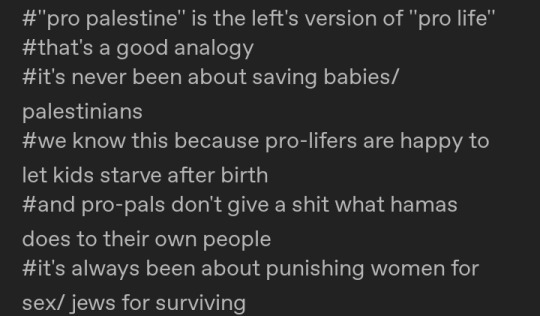
#"pro palestine" is the left's version of "pro life"
#that's a good analogy
#it's never been about saving babies/ palestinians
#we know this because pro-lifers are happy to let kids starve after birth
#and pro-pals don't give a shit what hamas does to their own people
#it's always been about punishing women for sex/ jews for surviving
940 notes
·
View notes
Note
Hii can I ask about your OC ideas for your fe game concept? Ooo and do you have any ideas for an overall story? 🤗
(Follow-up to this post)
First of all I AM SO SORRY ANON FOR TAKING SO LONG TO ANSWER THIS
I don't know what is it about my OCs and concepts, I want to talk about them but every time someone asks me about them I just procrastinate answering until the end of time😭
Anyway, here's all my main concepts, but they all have their posts where I go more into detail about them!
No. 1 - Gaia
The first OC I ever made is Gaia, a princess able to wield earth magic!
Her whole deal is that she constantly tries to hype herself up as this larger-than-life hero of legend (like the one she was named after) complete with theatrics... But it's all a facade to hide her massive impostor syndrome.
Basically, she'd be the comedic rival in a shonen.
But it turns out her impostor syndrom is kinda justified, since she's adopted. Which wouldn't be a problem if she didn't live in a world where the right blood gives you suoerpowers. And yes, this means she doesn't naturally have access to her earth magic and only does so temporarily because her parents secretly infused her with some of their blood without her knowing, which is not a viable solution for the future since bloodlines play a massive role in politics and basically every noble has access to some special blood. And if word got out that Gaia was adopted and her parents were infertile all along...
Gaia's whole story is about her whole world crashing down in multiple place, and finding her place in a world of demigods.
I don't have many ideas for her world yet save from being so reliant on bloodlines like Jugdral, but a few other ideas I had in mind were of it being a world where all dragons have gone long extinct but their legacy heavily influenced human culture, and the main villain trying to transfuse within himself every kind of Divine Blood in existence and using all their powers to become a new god and remake the world.
No. 2 - Sci-fi vs fantasy
The second main idea for an FE concept is one about fantasy vs sci-fi, where your typical FE world is invaded by a corporation from outer space, and the whole game would be about that dichotomy.
Two different cultures shown in a way very similar to Fates, with its separate sets of classes and weapons, two different campaign that take place in the same continuity where you play as a magic scholar trying to fight back against the invaders and a rogue engineer who becomes part of a rebellion, and a third final campaign to wrap the story up.
Basically the entire game would be about discussing the differences between the two worlds but most importantly the unlikely similarities, the fact magic and technology might secretly be connected and whenever the two can exist in symbiosis with each other.
Also a loose idea I had was of the local Divine Dragon being the descendant of a space tribe (because fuck yeah space dragons), where its monarch has been seized by the corporation and either has been turned into their ship they use to conquer planets or turned into an AI, and having the final fight be a confrontation between the two.
No.3 - Global turn count and time loop
Third and final main concept is one where you have a global turn count that affects the world and story, complete with a time rewind mechanic where the protagonist Kayla teams up with the local Dark Dragon to figure out what caused the end of the world and stop it, with a lot of context-sensitive dialogue in the style of Undertale and Hades. I went more into detail about this concept in a previous post.
And as a bonus small idea, I pictured an FE game that takes place in one of those cozy post-apocalyptic worlds where nature has taken back modern society, if only because a Fire Emblem with that setting sounds cool as shit
#ask replies#Anonymous#fire emblem#my writing#fe game concepts#gaia(oc)#kayla(oc)#will i ever make at least one of these? GOD i hope so#i'd be inclined to say never but i also said the same thing about making art so... :)
3 notes
·
View notes
Text
Kriegsmesser
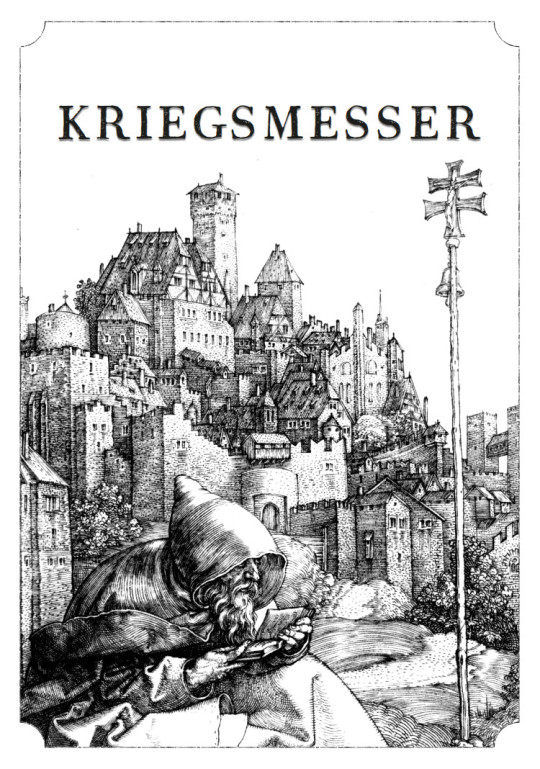
When I received Kriegsmesser in the mail I finally googled "kriegsmesser", and found out it meant "war knife". Which makes sense; Gregor Vuga's ZineQuest 2021 project is a tribute to "roleplaying games named after medieval weapons".
I love Warhammer Fantasy Roleplay's piss-renaissance Old World setting. I tend to pick up WFRP-a-likes sight unseen:
Warlock (quality);
Small But Vicious Dog (yesss);
Zweihander (which I have come to hate); etc.
Anyway: I backed Kriegsmesser without really knowing anything about it. So Kriegsmesser surprised me.
+
Kriegsmesser grew out of a Troika! cutting. Its 36 backgrounds are compatible with that system: each come with a couple of lines of description; a list of skills and possessions; an a visual cameo cropped from actual 16th-Century woodcut art.
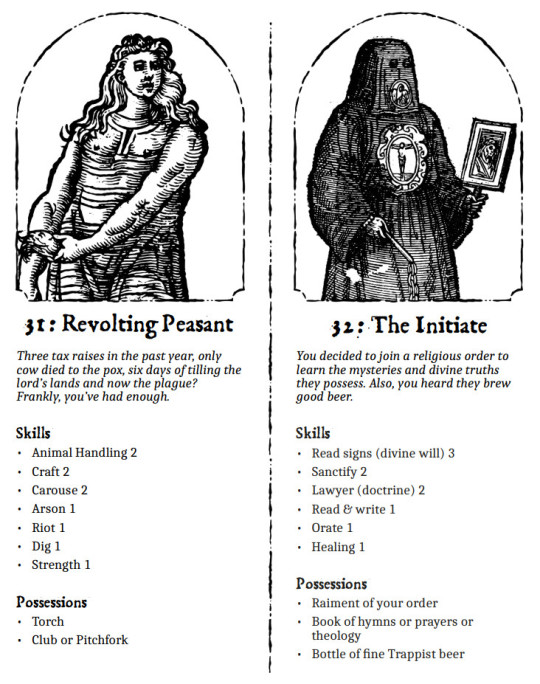
Cohesive and competently flavourful. My favourite is the Labourer, who always starts with "an empty pine box":
"You've spent your life breaking your back, working hard for other people's profit. You have nothing to show for it but a spectre of the future."
(The obligatory ratcatcher-analogue , called the Vermin Snatcher, is here -- check that box!)
+
Kriegsmesser also comes with its own ruleset. Hits all the notes it needs to, with lots of orientation and advice for how to run a game -- but ultimately super-simple, mechanically:
Roll d6s equal to the value in a relevant skill, look at the highest result. 6 means you get what you want; 5 or 4 means you get what you want, at a cost.
It's not quite a dice pool, since only the highest result matters. No opposed tests.
+
Kriegsmesser intends to have this base mechanic handle fights, too. The combat rules - with armour, toughness and weapon values -- are nested in an optional section.
For a WFRP-a-like, this feels like a purposeful departure.
Many of WFRP's most celebrated adventures are celebrated for bits that their underlying ruleset does little to support: the investigative structure of "Shadows Over Bogenhafen"; the complicated timetable of "Rough Night At Three Feathers".
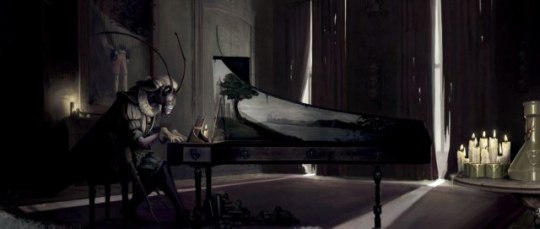
Ludwig von Wittgenstein never needed a statblock to be memorable.
Not to say that lethal, hyper-detailed fights isn't super Warhammer-y. (Kriegsmesser includes an injury table, broken down by body-part -- check that box!)
But here it feels like Gregor is saying: "I'm not Games Workshop and Roleplay isn't an ancillary of Warhammer Fantasy Battle; we can evoke grim-and-perilous-ness even if we fork away from heavy combat rules."
+

It has become ritual for me to read my partner Sharon to sleep.
Sometimes I read her RPG things. The other night, after I read her Kriegsmesser's introduction --
" The Empire wages an eternal war against Chaos. Its priests preach of Chaos as an intrusion, something unnatural ... These men see Chaos in anything that does not buttress their rule. They call it disorder, anarchy, corruption. They say that to rebel against their order is to rebel against god and nature. That the current arrangement is natural, rather than artificial.
" Meanwhile, the common people look to the Empire to deliver the justice that they were promised and they find none. They look to the Empire and do not see themselves reflected in it. They look around at what they were taught was right and good and see only misery.
" Their world begins to unravel. Chaos comes to reside in every heart and mind sound enough to look at the world and conclude it is broken. "
-- Sharon remarked: "Nice one."
The RPG things I read her generally leave Sharon lukewarm. She has enjoyed a couple -- but, yeah: for many of these books, text isn't their strong point.
Kriegsmesser is the only time I can recall Sharon praising the writing of an RPG book without my prompting.
Nice one.
+
That introduction surprised me. It underlines Kriegsmesser's biggest departure from its WFRP-a-like pedigree: how it characterises Chaos.
Corruption, a mainstay of most grim-dark-y games, is made an optional rule, like combat. Explaining this, Gregor writes:
" Kriegsmesser partially subverts or deconstructs the traditional conceit of Warhammer where the characters are threatened by the forces of Chaos. In this game it is the player characters who are the agents of 'Chaos': they are likely to become the 'rats' under the streets, and the wild 'beast-men' in the woods bringing civilisation down. It's the Empire and its nobles and priests that are corrupt ... "
Describing the Empire, Gregor writes:
" The Empire encompasses the world yet is terrified of the without. It enforces itself with steel and fire yet considers itself benevolent. It consumes the labour of others with bottomless hunger yet calls its subalterns lazy, or wasteful, or greedy. "
Holy shit this is the first time I've seen the word "subaltern" in an RPG thing, I think?
I love this.
+
Rant incoming:
With every passing decade Warhammer abridges its Moorcockian roots more and more; nowadays it is "Order = Good" and "Chaos = Evulz", pretty much.
Gone are the days when chaos berserkers are implied to grant safe passage to the helpless (because Khorne is as much a god of martial honour as he is a god of bloodletting); Or that the succor of Papa Nurgle is a genuine comfort to the downtrodden; Or that Tzeentch could unironically embody the principle of hope, of change for the better.
As Chaos is distilled into unequivocal villainy, Order goons get painted as Good Guys by default --
Giving rise to Warhammer's contemporary problem, wherein fans are no longer able to recognise satire.
+
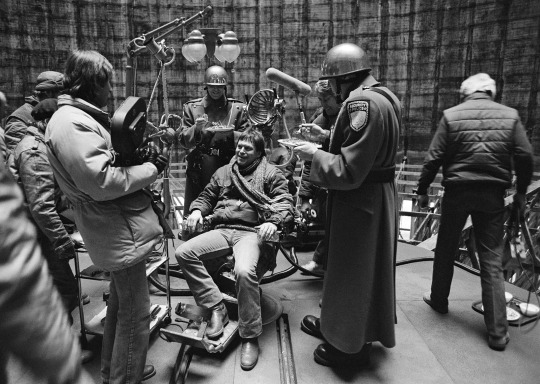
When I was introduced to 40K, it seemed pretty clear that the Imperium was a Brazil-esque absurdist-fascist bureaucratic state: planets are exterminatus-ed due to clerical error; the way it stamps out rebellions is the reason why rebellions begin in the first place.
Tragi-comic grimdarkness. That was the point.
Nowadays that tone has shifted -- and you're more likely than not going to encounter a 40K fan who argues that the Imperium's evils are a justified necessity, to prevent worse wrongs.
We went from:
"Space Nazis because insane dumbass fuckery, also chainswords vroom vroom rule of badass!"
To:
"Space Nazis because it makes sense actually, and also chainswords make sense because [insert convoluted rationalisation here]."
+
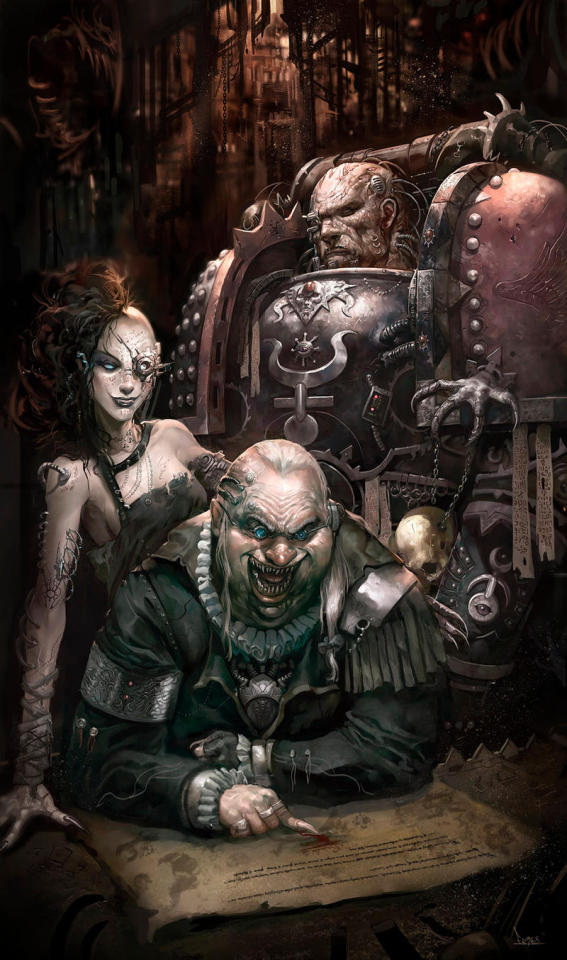
Even Fantasy Flight's Black Crusade line, which ostensibly offers a look at 40K from the perspective of Chaos, never truly commits to its conceit.
With prep you could play a heroic band of mutant freedom fighters, resisting the tyranny of the Evil Imperium --
But I don't remember Black Crusade giving that kind of campaign any actual support. Its supplements service the relatively more conventional "You can play villains!" angle; the Screaming Vortex is a squarely Daemons-vs-Daemons setting.
+
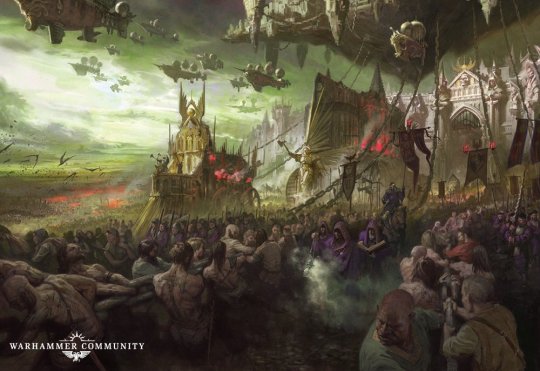
This tonal drift culminates, in my mind, with Age of Sigmar, Games Workshop's heroic-fantasy replacement of the old WFRP / WHFB setting.
Here's the framing narrative for AoS's recently-launched Third Edition. Let's see whether I've got things right:
A highly professionalised, technologically-superior tip-of-the-spear fighting force (the Stormcast Eternals);
Backed by an imperialist military-industrial complex (Azyrheim);
"Liberating" rich new territories (Ghur) for exploitation by a civilised settler culture (Settlers of Sig-- I mean, Free Cities);
Justified because the locals are irredeemable heathens (Chaos and Kruleboyz).
I mean, that's a sweet-ass Warhammer setting. It's contemporary, laser-guided lampoon. Except it is played totally straight.
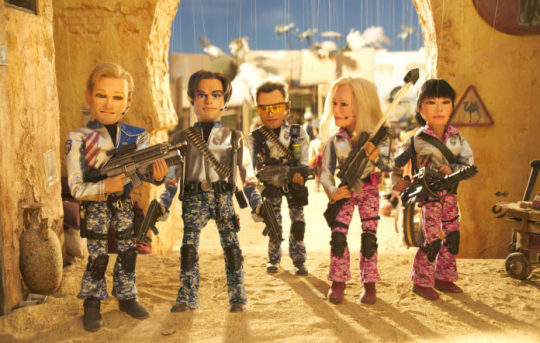
In AoS, a literal crusade is justified as the moral good.
+
I think Kriegsmesser surprised me because its framing of Chaos -- as a promise, as the light of hope shining through cracks of a broken world --
It feels so fucking right.
Yes: its a subaltern deconstruction of the conventional moral universe of Warhammer -- but it is a take that is also already implied / all but supported in the various depictions of the setting: from WFRP to the modified title-crawl of Black Crusade.
I'm annoyed I didn't think of it, myself. Damn you, Gregor!
And I'm annoyed that more Warhammer fans aren't thinking it, also.
+
lmagine if Kriegsmesser's perspective stood on equal standing as the GW orthodoxy. Imagine if, instead of simplifying stuff into "Order = Good" and "Chaos = Evulz", GW did a Gregor Vuga.
You'd have a Rashomon-ed Warhammer, where villainy depends on perspective:
You are fearful villagers, huddled around your priest, muttering prayers against the wild braying coming from the trees beyond your gates.
You are Aqshyian tribeswomen, defying the thunder warrior towering over you, the foreigner demanding you bow to his foreign god.
You are a Tzeentchian revolutionary cell, desperately trying to disrupt a Inquisitor's transmissions so your home planet isn't destroyed by fascist orbital fire.

+
Get Kriegsmesser HERE.
+++
( Image sources: https://theenemywithinremixed.wordpress.com/2021/05/21/thoughts-on-the-4e-death-on-the-reik/ https://www.criterion.com/current/posts/59-brazil https://www.deviantart.com/faroldjo/art/Warhammer-40k-Black-Crusade-273596035 https://www.warhammer-community.com/2021/06/09/fancy-a-new-life-bringing-order-to-the-mortal-realms-join-a-dawnbringer-crusade-today/ https://www.nme.com/blogs/the-movies-blog/team-america-15-anniversary-south-park-2558750 https://commons.wikimedia.org/wiki/File:Palestinian_children_and_Israeli_wall.jpg )
60 notes
·
View notes
Text
Spider-Man (PS4) - REVIEW
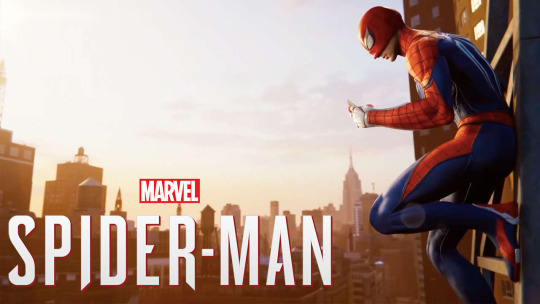
SYNOPSIS
The super-human crime lord Mister Negative orchestrates a plot to seize control of New York City’s criminal underworld. When Mister Negative threatens to release a deadly virus, Spider-Man must confront him and protect the city while dealing with the personal problems of his civilian persona, Peter Parker.
youtube
I am very selective about the video games I buy, play and subsequently complete but there are few games that I complete in full and repeat that journey several times over. Spider-Man is one of those games and when all is said and done; I consider it not only one of the best games I've played in the last 10 years but one of the best games I've ever played. The game is a third person open world experience that gives you free rein across New York City while you web sling as Peter Parker/Spider-Man. Throughout the game there are a variety of objectives to complete such as seeking out collectables, photographing city landmarks, fighting crime and completing various stealth, combat and timed challenges. If you played the Spider-Man 2 game on the PlayStation 2 then the basic concept will be very familiar but that concept has been heavily refined thus making this the definitive Spider-Man experience.
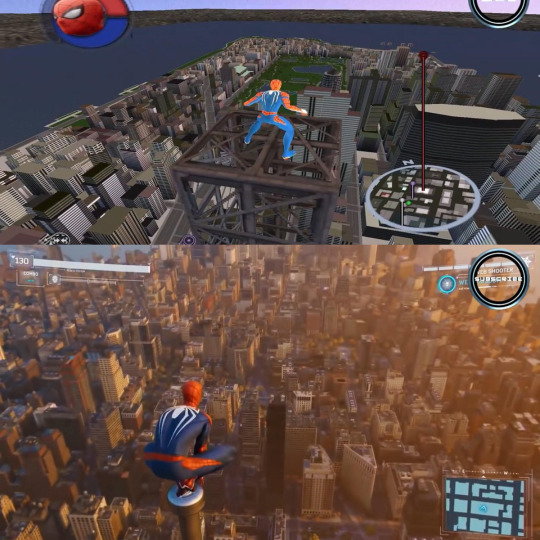
NEW YORK, NEW YORK
Spider-Man’s New York is glorious to behold with its vast skyscrapers and iconic landmarks all yours to explore and get lost in. But as visually stunning as it is, there isn’t much about the design that I haven't seen before and what struck me the most during my first play through was a sense of familiarity. As with the PS2 game, the web slinging mechanic is by far the biggest selling point of the game especially as it is at the centre of everything you do. Zipping through New York is unbelievably satisfying, addictive and strangely therapeutic to the point that I found myself just web slinging through the city with no particular destination in mind. The only slight downside for me is the lack of risk or consequence with the web slinging itself. Throwing yourself off the tallest skyscraper to the ground doesn’t result in death which I feel takes you out of the experience ever so slightly. It’s a feature that the PS2 game had and I feel it should’ve been carried over here. But it’s a very minor criticism and is ultimately drowned out by the amount of content and activities you come across.
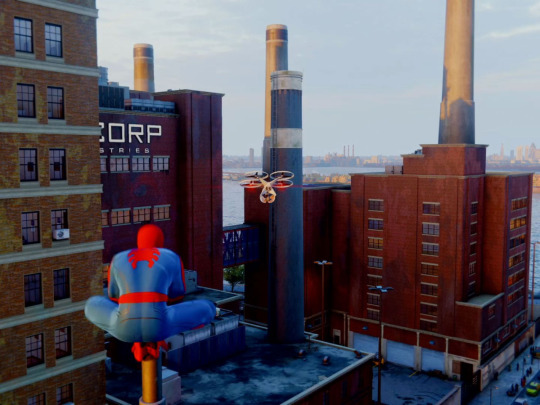
KEY TO THE CITY
Between story missions you’re given the freedom of the city to explore and complete the various side missions, collectables, bases and challenges that are spread throughout the city. Whilst the collectables are as basic as they come, the remaining content is where the fun can be found and the Tokens you are awarded are just as important for upgrading as the main story skill points. Admittedly not all the options available during free roam are equally exciting or challenging (Bag tokens vs. Stealth challenge?) and there's undoubtedly a risk of repetitiveness setting in especially for some players for sure. However I found that finding the right balance between story and free roam kept things fresh and varied throughout my run; again it is the freedom to play how you want that is key. But is the effort worth it and do the skills and upgrades really make a difference?
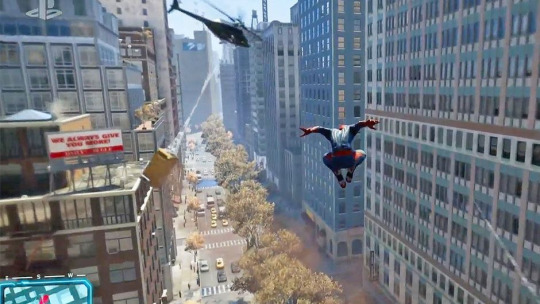
PROGRESSION IS KEY
The answer is most definitely yes to that last point, I’m not saying that every option (Suit Mod), gadget (Suspension Matrix) and upgrades are good, some are weaker than others while some I just didn’t engage with. But the upgrades you acquire actually has an impact on the quality of play and gives you more freedom as a player in how you traverse the city, engage in combat and conduct stealth missions. The enemy quality also evolves with you and introduces types who require specific tactics to defeat while others are resistance to certain gadgets and moves. Anyone familiar with the Batman Arkham games will recognize both the stealth and combat styles but here it is distinctly designed with Spider-Man in mind and flows differently as a result. Combat is often fun and varied enough to keep you going and of course Spider-Man’s personality and quips give things an extra lift. What the game lacks in originality in these regards it makes up for in execution, style and a real sense of fun. But for all the familiarity and refinement, what brings it all together and brought me back for 3 run throughs is the story.
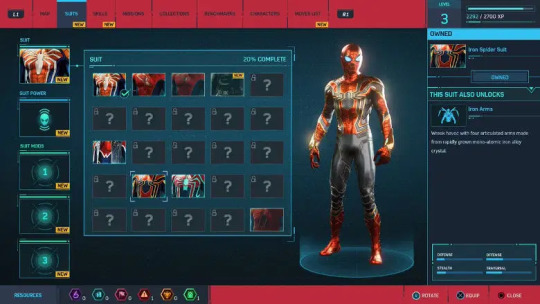
CINEMATIC SCALE
The scale story is something of a surprise and one that you should experience for yourself so I won’t be mentioning specific spoilers. However it does start off slow and from the street level that helps define Spider-Man by giving you the time to get to the know the characters and come to understand where their relationships are at. There are familiar characters, both friend and foe, who make appearances but this is a stand alone story not linked to any previous Spider-Man film. The script, voice acting and graphics are superb allowing the characters to feel authentic and you as the player to become fully immersed and invested in them. It’s tempting to run straight through the story missions to see what happens next but I would again recommend a balanced approach so you can experience the game in full. The story is funny, action packed, emotional, tense and tragic, it hits all the right notes and left me desperately wanting to return to revisit these characters and this world by the end. It is the best Spider-Man movie that never was.
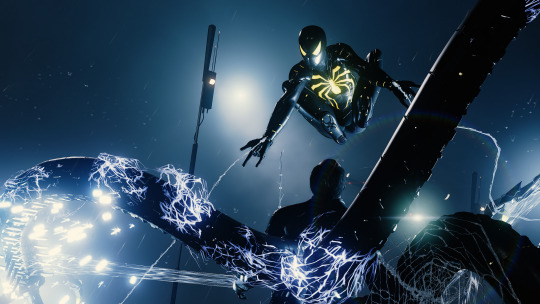
OVERALL
Spider-Man is a joy to play. Yes I’ve spoken about familiarity but that doesn’t take away how the developers have refined these familiar elements into a definitive Spider-Man experience. The game is consistently fun and thrilling throughout. The story is an absolute triumph; authentic, heartfelt, funny, action packed and tragic and one that has kept me coming back time and again. What sets this out from and outshines other superhero games is because of that investment from the player and the emotional stakes generated by the excellently written story. Gameplay offers more than enough variety with a vast open world where traversing is just as fun as actually playing through. It’s right up there in the battle foe the title of best superhero game ever made and I personally can’t wait to play the sequel and other sequels (hopefully) to come.
5/5
#Youtube#marvel#marvel video games#video games#insominac#insomniac games#sony interactive entertainment#stan lee#spider man#spider man game#spider man ps4#peter parker#mary jane watson#aunt may#miles morales#mister negative#wilson fisk#the kingpin#otto octavius#doc ock#j jonah jameson#norman osborn#new york#manhattan#open world games#superhero game#review
2 notes
·
View notes
Text
Vintage Shows to Watch While You Wait for the Next Episode of WandaVision - The 60s
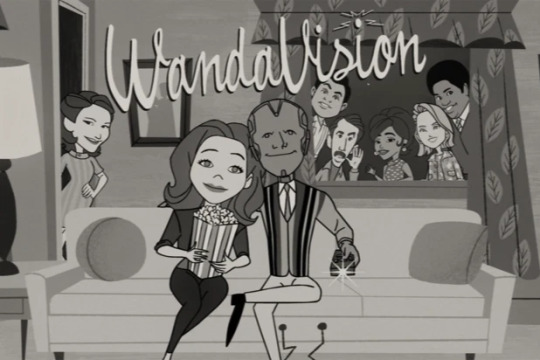
So the 60s is the era that Wandavision pulls most heavily from for it’s inspiration. So much so that one could make the argument that each of the first three episodes are all set in the 1960s. Episode one pulls from the early 60s with multiple Dick Van Dyke refences, episode two is very Bewitched inspired, and episode three is aesthetically very similar to The Brady Bunch which started in ‘69. As such it was hard to narrow down the list for this decade and I had to get creative in some ways.
1. The Andy Griffith Show (1960 - 1968)

The Andy Griffith Show gets kind of a bad rap now a days for being, supposedly, a conservative’s wet dream. People claiming it as such have apparently never actually seen the series. Oh yes, it’s very much set in white rural 60s America and will occasionally present the obliviously outdated joke, but the story of a widowed sheriff being the only sane man in a small town full of lovable lunatics, who prefers to solve his and others problems with negotiation and hair brained schemes as opposed to violence has far more in common with modern day Steven Universe than whatever genocidal fantasy fake rednecks have in their heads.
As the gif above shows Andy Griffith was very subtlety progressive for its time. Andy was a stanch pacifist, pro-gun control, treated drug addicts and prisoners with respect, and all the women he would date had careers, ect. and so on. It’s not a satire making any sort of grand political statements but the series had a moral center that was far more left than many realize.
But if it’s not a satire, then what type of comedy is it?
The Andy Griffith Show excels in what I like to call, ‘awkward comedy’. See everyone in Mayberry is far too nice to just come out and tell a character they’re making an ass of themselves, so therefore whoever is the idiot punching bag of the episode’s focus must slowly unravel as everyone looks on in helpless pity until said character realizes the folly of their ways and the townsfolk come together to make them feel happy and accepted once more. Wandavision takes this polite idyllic awkwardness and plays it up for horror instead of laughs.
2. The Dick Van Dyke Show (1961 - 1966)

The creators of Wandavision actually met with Dick Van Dyke himself to pick his brain and learn how sitcoms were made back then. Paul Bentley also took inspiration from Van Dyke in his performance of the sitcom version of Vision, while Olsen stated Mary Tylor Moore had a heavy influence on her character of Wanda. But more than just being a point of homage, The Dick Van Dyke Show was hugely influential in modernizing the family sitcom and breaking a lot of the unspoken traditions and ‘rules’ of the 50s television era. It’s also just really, really funny.
3.The Alfred Hitchcock Hour (1962 - 1965)
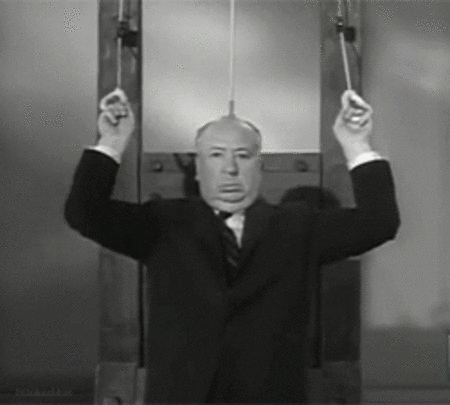
Bit of a cheat here. Alfred Hitchcock Presents actually started in 1955 as a half hour anthology show, but in ‘62 the show got a revamp and was extended into a full hour tv series. I knew I wanted The Twilight Zone to be covered in my episode one recap, but ‘The Master of Suspense’ couldn’t be forgotten. While The Twilight Zone reveled in the surreal and supernatural, Alfred Hitchcock pioneered the thriller genre and made real life seem dangerous, horrifying, and other worldly.
4. Doctor Who (1963 - present day) vs Star Trek (1966 - present day)

Just like how westerns dominated the air waves during the 50s, science fiction was the center of the cultural zeitgeist of the 60s. From Lost in Space to My Favorite Martian, space aliens and robots were everywhere. So naturally I had to name drop the two sci-fi juggernauts that still air to this today. If you thought that the rivalry between Star Wars and Star Trek was bad then you’ve never seen a chat full of Whovians and Trekkies duking it out over who is the better monster, the Borg or the Cyberman. But which one has the more influence over Wandavision?
Well Star Trek owes it’s existence to sitcoms. As with The Twilight Zone before it, Star Trek was produced by Desilu Productions and it’s co-founder and CEO, Lucille Ball, was the series biggest supporter behind the scenes, lobbying for it when it faced early cancelation. As with all things sitcomy, everything ties back to I Love Lucy in the end. However despite that little backstory, it would seem that the series has very little to do with Wandavision itself beyond being quintessentially American.
I would argue that Wandavision owes much to Doctor Who though. Arguably more so than any show mentioned in this retrospective. Time travel, alternate realities, trouble in quite suburbia, brainwashing, people coming back from the dead, ect... just about every trope you can find in Wandavision has also appeared in Doctor Who at some point. As a series that can go anywhere and do anything, Doctor Who was a pioneer of marrying genres in new and interesting ways.
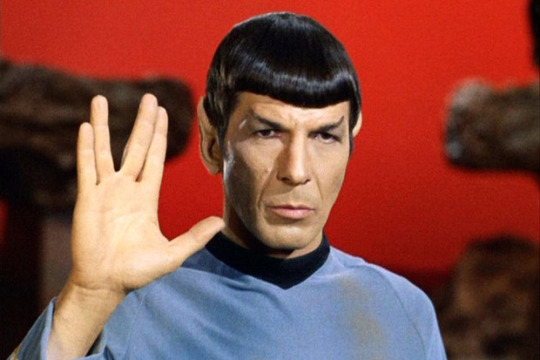
5. Bewitched (1964 - 1972) and I Dream of Jeannie (1965 - 1970)

It’s hard to pick one series over another because they’re essentially the same show. A mortal man falls in love with a magical girl who upends their lives with magic filled hijinks as they try their best not to have their secret discovered by the rest of the world. And both have their fingerprints all over the DNA of Wandavision.
There’s only two core differences; Samantha and Jeannie have completely different personalities, with Sam being confident and knowledgeable and Jeannie being naïve and oblivious, along with their relationships with their respective men, Sam and Darrin being married and in love at the start of the series and Jeannie chasing after Tony in the beginning in a will they/won’t they affair, finally only getting together in the last season.
6. The Munsters (1964 - 1966) vs The Adams Family (1964 - 1966)

Fans of these two shows are forever sadden that there never was a crossover between them. Because they’d fit perfectly together. Both shows are about a surreal and macabre family living in American suburbia and disrupting the lives of their neighbors with their otherworldly hijinks. Sound familiar?
The main difference between the two shows is the way the characters viewed their placement in the world they inhabit.
The Munsters were always oblivious to the fact that didn’t fit in. They just automatically assumed everyone had the same personal tastes as them. Whenever they encountered anyone who behaved strangely around them they would write that person off as being the odd one rather than questioning themselves. As such the main cast was structured like a stereotypical sitcom family who just happened to be classic movie monsters.
The Addams were well aware that they were abnormal and they loved it! They lived life with in their own little world and didn’t care what anyone thought of them. As such the characters were far more colorful and quirky as individuals but there was little in the way of refences to other horror franchises beyond just a general love of the twisted and strange.
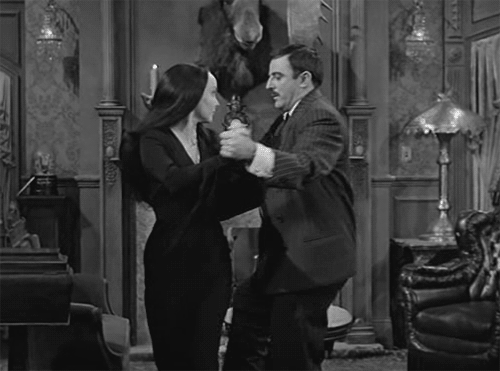
7. Green Acres (1965 - 1971) and the Rual-verse (1962 - 1971)
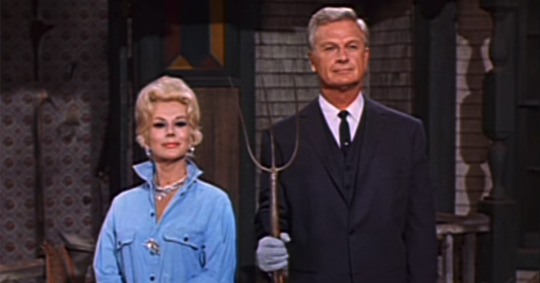
So the MCU is not the first franchise to bring viewers an interconnected universe to the small screen. Far from it, as sitcoms had been doing this for decades, starting with the ‘rualverse’. Beverly Hillbillies, Petticoat Junction, and Green Acres were all produced by the same company and were treated as spinoffs of each other, complete with crossovers and shared characters and sets.
Of the three, the last show, Green Acres, has the most in common with Wandavision. A well to do businessman and his lovely socialite wife settle down in small town America on a farm in order to get away from the stresses of city life, only to find new stresses in the country. Eva Gabor, herself a natural Hungarian, plays the character of Lisa as Hungarian making her one of the few non-native born Americans on tv screens during the cold war. Despite her posh nature and original protests to the move, Lisa assimilates to the rural life far easier than her husband, Oliver. Who, as the main comedic thread, can’t comprehend his new quirky neighbors’ odd and often illogical behavior.
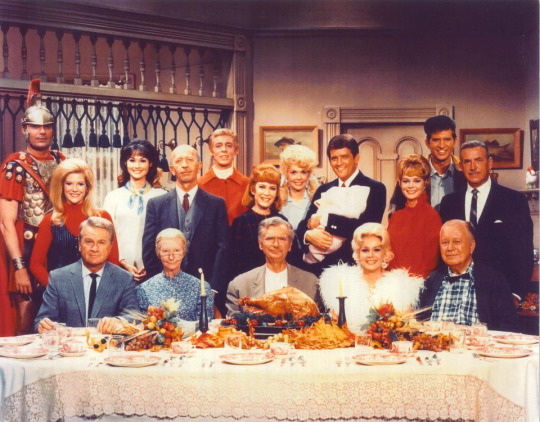
8. Hogan’s Heroes (1965 - 1971) and Get Smart (1965 - 1969)

So as comic fans have been quick to point out, it’s looking like both A.I.M. (Hydra) and Sword (Shield) will be players in the story of Wandavision. To commemorate that here’s two shows to represent those opposing sides. Although in truth, neither series has anything else in common with each other but I need to condense things down someway.
In Hydra’s corner we got Hogan’s Heroes. A show all about taking down Nazis from within.
I love, love, love, ‘robin hood’ comedies where a group of con artists try week after to week to pull one over the establishment. The Phil Silvers Show, Mchale's Navy, and Top Cat, just to name a few examples are all childhood favorites of mine. However while those shows had a lot of morally ambiguous characters, Hogan’s Heroes has very clear cut good guys and bad guys, cause the bad guys are Nazis and the show relentless makes fun of the third reich as should we all. In fact I was watching Hogan’s Heroes while waiting for the GA run off election results. Fortunately my home state decided to kick out our own brand of Nazis this year.
For Shield, we got the ultimate spy spoof, Get Smart. Starring, Inspector Gadget himself, Don Adams, as the bumbling Maxwell Smart. Get Smart, is a hilarious send up of Cold War espionage but the real selling point of the show, imho, is Max and his co-worker 99′s relationship. You can cut the sexual tension in the air with a knife all while laughing your ass off.
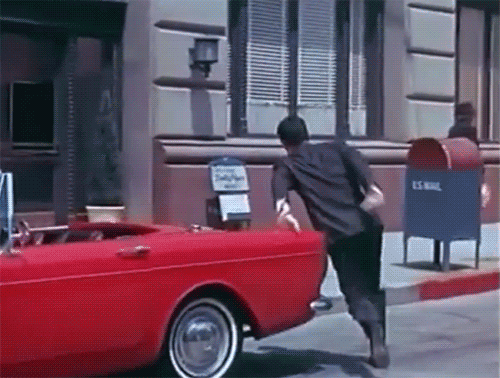
9. Batman (1966 - 1968)
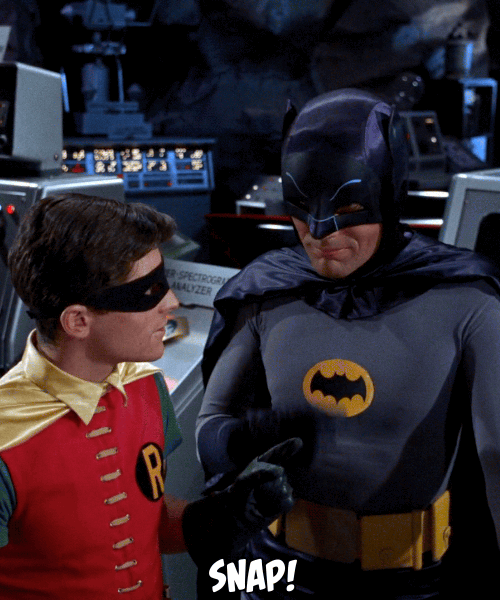
First was Superman and then came Batman. Yet while Superman was a serious action show, Batman was a straight up comedy. Showcasing that superheroes could indeed be funny.
Also shout out for Batman being the only show on this list to have an actual crossover with it’s competitor, The Green Hornet.
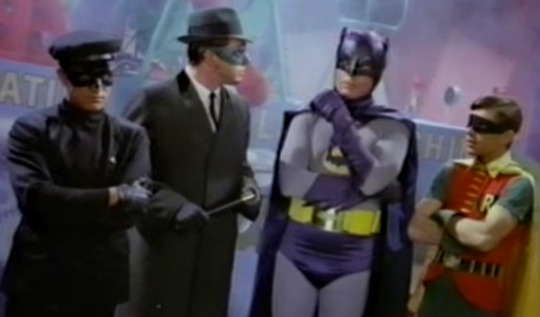
10. Julia (1968 - 1971)

Since episode two features the first appearances of Herb and Monica, let’s highlight the first black led sitcom since the cancelation of Amos ‘n Andy over a decade earlier. The show focuses on single mother and military nurse, Julia, as she tries to live her life without her recently decease husband, who was killed in Vietnam, as she tries to raise their six year old son on her own.
The series is cute. It’s more of a throw back to earlier family sitcoms where there’s no fantasy and life lessons are the name of the game. It’s the fact that the main character is a single black woman is what made the show so subversive and important at the time.
Runner Ups
There’s much good stuff in the 60s, so here’s some others that didn’t make the cut but I would recommend anyways.
Car 54, Where Are You? (1961 - 1963)
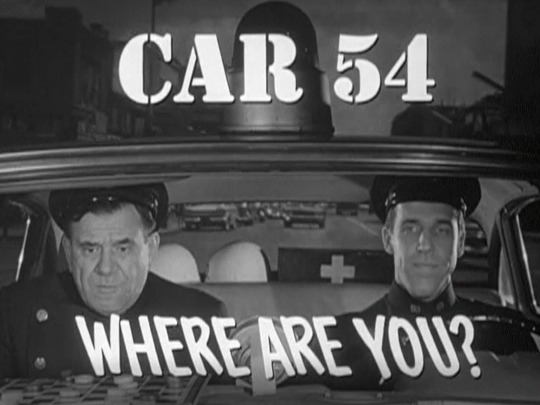
I call this the Brooklynn 99 of the 1960s. Bumbling but well meaning Officer Toody longs to do good in the world and help anyone in need, but often screws things up with his ill thought out schemes. He often drags his best friend and partner, the competent but anxiety riddled, Muldoon into his escapades.
Mr. Ed (1961 - 1966)
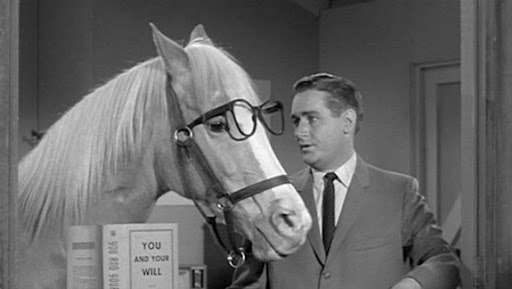
The grandfather of the sarcastic talking pet trope.
The Jetsons (1962 - 1963 and 1985 - 1987)
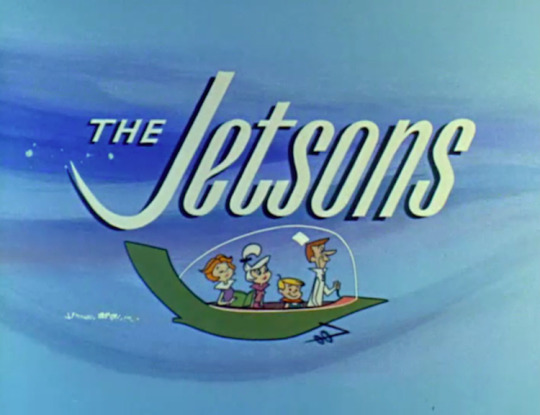
Hanna-Barbera often took popular sitcoms and just repackaged them as cartoons with a fantasy theme to them. The Jetsons has no singular show that it rips-off but is rather more a grab bag of sitcom tropes that feature, robots, computers, and flying cars.
The Outer Limits (1963 - 1965)

The Outer Limits was The Twilight Zone’s biggest competitor in terms of being a sic-fi/horror anthology series.
Gillian’s Island (1964 - 1967)
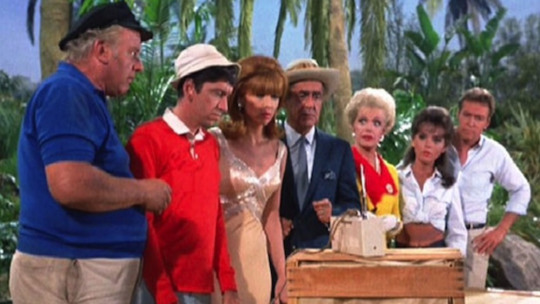
The only comparison to WandaVision I could think of was that this is a sitcom about people being trapped in one place. But by that point I was running out of room on the list. Still it’s one of the funniest shows on here.
So yeah, this took longer than expected cause there’s a lot, here. Hopefully the 70s will be easier. Which I’ll post on Friday.
117 notes
·
View notes
Link
Imagine that the US was competing in a space race with some third world country, say Zambia, for whatever reason. Americans of course would have orders of magnitude more money to throw at the problem, and the most respected aerospace engineers in the world, with degrees from the best universities and publications in the top journals. Zambia would have none of this. What should our reaction be if, after a decade, Zambia had made more progress?
Obviously, it would call into question the entire field of aerospace engineering. What good were all those Google Scholar pages filled with thousands of citations, all the knowledge gained from our labs and universities, if Western science gets outcompeted by the third world?
For all that has been said about Afghanistan, no one has noticed that this is precisely what just happened to political science. The American-led coalition had countless experts with backgrounds pertaining to every part of the mission on their side: people who had done their dissertations on topics like state building, terrorism, military-civilian relations, and gender in the military. General David Petraeus, who helped sell Obama on the troop surge that made everything in Afghanistan worse, earned a PhD from Princeton and was supposedly an expert in “counterinsurgency theory.” Ashraf Ghani, the just deposed president of the country, has a PhD in anthropology from Columbia and is the co-author of a book literally called Fixing Failed States. This was his territory. It’s as if Wernher von Braun had been given all the resources in the world to run a space program and had been beaten to the moon by an African witch doctor.
…
Phil Tetlock’s work on experts is one of those things that gets a lot of attention, but still manages to be underrated. In his 2005 Expert Political Judgment: How Good Is It? How Can We Know?, he found that the forecasting abilities of subject-matter experts were no better than educated laymen when it came to predicting geopolitical events and economic outcomes. As Bryan Caplan points out, we shouldn’t exaggerate the results here and provide too much fodder for populists; the questions asked were chosen for their difficulty, and the experts were being compared to laymen who nonetheless had met some threshold of education and competence.
At the same time, we shouldn’t put too little emphasis on the results either. They show that “expertise” as we understand it is largely fake. Should you listen to epidemiologists or economists when it comes to COVID-19? Conventional wisdom says “trust the experts.” The lesson of Tetlock (and the Afghanistan War), is that while you certainly shouldn’t be getting all your information from your uncle’s Facebook Wall, there is no reason to start with a strong prior that people with medical degrees know more than any intelligent person who honestly looks at the available data.
…
I think one of the most interesting articles of the COVID era was a piece called “Beware of Facts Man” by Annie Lowrey, published in The Atlantic.
…
The reaction to this piece was something along the lines of “ha ha, look at this liberal who hates facts.” But there’s a serious argument under the snark, and it’s that you should trust credentials over Facts Man and his amateurish takes. In recent days, a 2019 paper on “Epistemic Trespassing” has been making the rounds on Twitter. The theory that specialization is important is not on its face absurd, and probably strikes most people as natural. In the hard sciences and other places where social desirability bias and partisanship have less of a role to play, it’s probably a safe assumption. In fact, academia is in many ways premised on the idea, as we have experts in “labor economics,” “state capacity,” “epidemiology,” etc. instead of just having a world where we select the smartest people and tell them to work on the most important questions.
But what Tetlock did was test this hypothesis directly in the social sciences, and he found that subject-matter experts and Facts Man basically tied.
…
Interestingly, one of the best defenses of “Facts Man” during the COVID era was written by Annie Lowrey’s husband, Ezra Klein. His April 2021 piece in The New York Times showed how economist Alex Tabarrok had consistently disagreed with the medical establishment throughout the pandemic, and was always right. You have the “Credentials vs. Facts Man” debate within one elite media couple. If this was a movie they would’ve switched the genders, but since this is real life, stereotypes are confirmed and the husband and wife take the positions you would expect.
…
In the end, I don’t think my dissertation contributed much to human knowledge, making it no different than the vast majority of dissertations that have been written throughout history. The main reason is that most of the time public opinion doesn’t really matter in foreign policy. People generally aren’t paying attention, and the vast majority of decisions are made out of public sight. How many Americans know or care that North Macedonia and Montenegro joined NATO in the last few years? Most of the time, elites do what they want, influenced by their own ideological commitments and powerful lobby groups. In times of crisis, when people do pay attention, they can be manipulated pretty easily by the media or other partisan sources.
If public opinion doesn’t matter in foreign policy, why is there so much study of public opinion and foreign policy? There’s a saying in academia that “instead of measuring what we value, we value what we can measure.” It’s easy to do public opinion polls and survey experiments, as you can derive a hypothesis, get an answer, and make it look sciency in charts and graphs. To show that your results have relevance to the real world, you cite some papers that supposedly find that public opinion matters, maybe including one based on a regression showing that under very specific conditions foreign policy determined the results of an election, and maybe it’s well done and maybe not, but again, as long as you put the words together and the citations in the right format nobody has time to check any of this. The people conducting peer review on your work will be those who have already decided to study the topic, so you couldn’t find a more biased referee if you tried.
Thus, to be an IR scholar, the two main options are you can either use statistical methods that don’t work, or actually find answers to questions, but those questions are so narrow that they have no real world impact or relevance. A smaller portion of academics in the field just produce postmodern-generator style garbage, hence “feminist theories of IR.” You can also build game theoretic models that, like the statistical work in the field, are based on a thousand assumptions that are probably false and no one will ever check. The older tradition of Kennan and Mearsheimer is better and more accessible than what has come lately, but the field is moving away from that and, like a lot of things, towards scientism and identity politics.
…
At some point, I decided that if I wanted to study and understand important questions, and do so in a way that was accessible to others, I’d have a better chance outside of the academy. Sometimes people thinking about an academic career reach out to me, and ask for advice. For people who want to go into the social sciences, I always tell them not to do it. If you have something to say, take it to Substack, or CSPI, or whatever. If it’s actually important and interesting enough to get anyone’s attention, you’ll be able to find funding.
If you think your topic of interest is too esoteric to find an audience, know that my friend Razib Khan, who writes about the Mongol empire, Y-chromosomes and haplotypes and such, makes a living doing this. If you want to be an experimental physicist, this advice probably doesn’t apply, and you need lab mates, major funding sources, etc. If you just want to collect and analyze data in a way that can be done without institutional support, run away from the university system.
The main problem with academia is not just the political bias, although that’s another reason to do something else with your life. It’s the entire concept of specialization, which holds that you need some secret tools or methods to understand what we call “political science” or “sociology,” and that these fields have boundaries between them that should be respected in the first place. Quantitative methods are helpful and can be applied widely, but in learning stats there are steep diminishing returns.
…
Outside of political science, are there other fields that have their own equivalents of “African witch doctor beats von Braun to the moon” or “the Taliban beats the State Department and the Pentagon” facts to explain? Yes, and here are just a few examples.
Consider criminology. More people are studying how to keep us safe from other humans than at any other point in history. But here’s the US murder rate between 1960 and 2018, not including the large uptick since then.
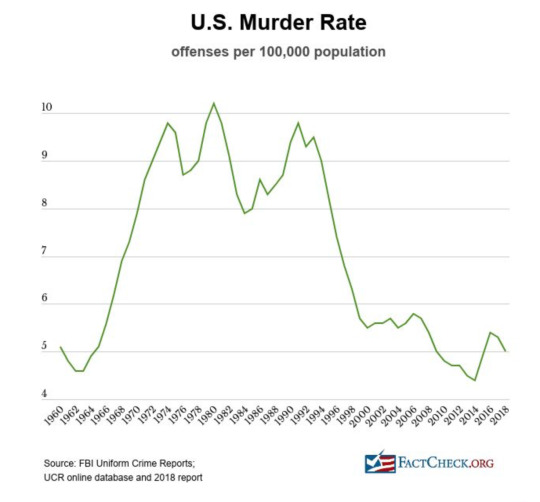
So basically, after a rough couple of decades, we’re back to where we were in 1960. But we’re actually much worse, because improvements in medical technology are keeping a lot of people that would’ve died 60 years ago alive. One paper from 2002 says that the murder rate would be 5 times higher if not for medical developments since 1960. I don’t know how much to trust this, but it’s surely true that we’ve made some medical progress since that time, and doctors have been getting a lot of experience from all the shooting victims they have treated over the decades. Moreover, we’re much richer than we were in 1960, and I’m sure spending on public safety has increased. With all that, we are now about tied with where we were almost three-quarters of a century ago, a massive failure.
What about psychology? As of 2016, there were 106,000 licensed psychologists in the US. I wish I could find data to compare to previous eras, but I don’t think anyone will argue against the idea that we have more mental health professionals and research psychologists than ever before. Are we getting mentally healthier? Here’s suicides in the US from 1981 to 2016
…
What about education? I’ll just defer to Freddie deBoer’s recent post on the topic, and Scott Alexander on how absurd the whole thing is.
Maybe there have been larger cultural and economic forces that it would be unfair to blame criminology, psychology, and education for. Despite no evidence we’re getting better at fighting crime, curing mental problems, or educating children, maybe other things have happened that have outweighed our gains in knowledge. Perhaps the experts are holding up the world on their shoulders, and if we hadn’t produced so many specialists over the years, thrown so much money at them, and gotten them to produce so many peer reviews papers, we’d see Middle Ages-levels of violence all across the country and no longer even be able to teach children to read. Like an Ayn Rand novel, if you just replaced the business tycoons with those whose work has withstood peer review.
Or you can just assume that expertise in these fields is fake. Even if there are some people doing good work, either they are outnumbered by those adding nothing or even subtracting from what we know, or our newly gained understanding is not being translated into better policies. Considering the extent to which government relies on experts, if the experts with power are doing things that are not defensible given the consensus in their fields, the larger community should make this known and shun those who are getting the policy questions so wrong. As in the case of the Afghanistan War, this has not happened, and those who fail in the policy world are still well regarded in their larger intellectual community.
…
Those opposed to cancel culture have taken up the mantle of “intellectual diversity” as a heuristic, but there’s nothing valuable about the concept itself. When I look at the people I’ve come to trust, they are diverse on some measures, but extremely homogenous on others. IQ and sensitivity to cost-benefit considerations seem to me to be unambiguous goods in figuring out what is true or what should be done in a policy area. You don’t add much to your understanding of the world by finding those with low IQs who can’t do cost-benefit analysis and adding them to the conversation.
One of the clearest examples of bias in academia and how intellectual diversity can make the conversation better is the work of Lee Jussim on stereotypes. Basically, a bunch of liberal academics went around saying “Conservatives believe in differences between groups, isn’t that terrible!” Lee Jussim, as someone who is relatively moderate, came along and said “Hey, let’s check to see whether they’re true!” This story is now used to make the case for intellectual diversity in the social sciences.
Yet it seems to me that isn’t the real lesson here. Imagine if, instead of Jussim coming forward and asking whether stereotypes are accurate, Osama bin Laden had decided to become a psychologist. He’d say “The problem with your research on stereotypes is that you do not praise Allah the all merciful at the beginning of all your papers.” If you added more feminist voices, they’d say something like “This research is problematic because it’s all done by men.” Neither of these perspectives contributes all that much. You’ve made the conversation more diverse, but dumber. The problem with psychology was a very specific one, in that liberals are particularly bad at recognizing obvious facts about race and sex. So yes, in that case the field could use more conservatives, not “more intellectual diversity,” which could just as easily make the field worse as make it better. And just because political psychology could use more conservative representation when discussing stereotypes doesn’t mean those on the right always add to the discussion rather than subtract from it. As many religious Republicans oppose the idea of evolution, we don’t need the “conservative” position to come and help add a new perspective to biology.
The upshot is intellectual diversity is a red herring, usually a thinly-veiled plea for more conservatives. Nobody is arguing for more Islamists, Nazis, or flat earthers in academia, and for good reason. People should just be honest about the ways in which liberals are wrong and leave it at that.
…
The failure in Afghanistan was mind-boggling. Perhaps never in the history of warfare had there been such a resource disparity between two sides, and the US-backed government couldn’t even last through the end of the American withdrawal. One can choose to understand this failure through a broad or narrow lens. Does it only tell us something about one particular war or is it a larger indictment of American foreign policy?
The main argument of this essay is we’re not thinking big enough. The American loss should be seen as a complete discrediting of the academic understanding of “expertise,” with its reliance on narrowly focused peer reviewed publications and subject matter knowledge as the way to understand the world. Although I don’t develop the argument here, I think I could make the case that expertise isn’t just fake, it actually makes you worse off because it gives you a higher level of certainty in your own wishful thinking. The Taliban probably did better by focusing their intellectual energies on interpreting the Holy Quran and taking a pragmatic approach to how they fought the war rather than proceeding with a prepackaged theory of how to engage in nation building, which for the West conveniently involved importing its own institutions.
A discussion of the practical implications of all this, or how we move from a world of specialization to one with better elites, is also for another day. For now, I’ll just emphasize that for those thinking of choosing an academic career to make universities or the peer review system function better, my advice is don’t. The conversation is much more interesting, meaningful, and oriented towards finding truth here on the outside.
11 notes
·
View notes
Text
Does Bing gē Have Descendants in ‘The Untold Tale?’
This topic has come up a few times since The Untold Tale takes place in the PIDW universe (post-Bingge vs Bingmei extra), I figured I might as well compile and archive my official answer here for me to refer my AO3 readers to in the future for convenience’s sake. I hope everyone doesn’t mind. :) I’m always happy to answer questions!
TL;DR
Q: Will we see Bing gē having fathered children with his harem of 600 or so wives in TUT?
A: For TUT, the answer is a definite “no.” There were a lot of factors which’d contributed to my decision. I’ll try to explain my reasoning down below.
Context
In PIDW, it is canon that Luo Binghe has a bountiful number of descendants with his harem of 600-or-so wives. It is a detail that has been mentioned even in ch1 of SVSSS and in ep1 of the donghua.

(SVSSS Excerpt - ch1)

(SVSSS donghua - ep1)
I like to plan things ahead of time. So from very early on, I knew this would be something I would have to decide on whether or not to address when I’d finally decided to expand TUT from just a prologue into a full-blown story. And after contemplating it, I decided against adding children into the story. It is because 1) it would make the situation more complicated, and 2) it would take TUT in a different direction that wouldn’t be fun for me to write.
I’m a very decisive writer, meaning when I make my mind up about something, chances are I won’t change my mind. This is because I would have already planned it into my plot outline, which means changing a decision would require me to change other details in the other chapters I have planned for that story. (I’m typically not a spontaneous writer; I try not to write spontaneously because when you’re a writer who rotates through multiple WIPs with different characters across different genres or writing styles, you inevitably have writer’s block because you probably won’t remember all the ideas or the direction you had whenever you return back to a different WIP. To reduce this shortcoming, it helps me personally to have a plot outline. This way I can return to any WIP, read my notes and then transcribe them into legible paragraphs, find a way to transition between the story beats I have to hit for that chapter, and then eventually post the final draft to AO3 when I feel it’s ready.)
Having made a decision, I knew I had to set it up in TUT and give a “reasonable explanation in-story.” Hence, in ch2, we see:

(Excerpt I - ch2)
Basically the set-up is TUT takes place post-Bingge vs Bingmei, but between “the third or fourth book” of the hypothetical PIDW webnovel series aka before Airplane wrote the fanservicey chapters where the luckier of LBH’s wives give birth to children during the harem drama plots and the children are probably rarely, if ever, mentioned again in the story as a lot of stallion novels tend to do.

(Excerpt II - ch2)
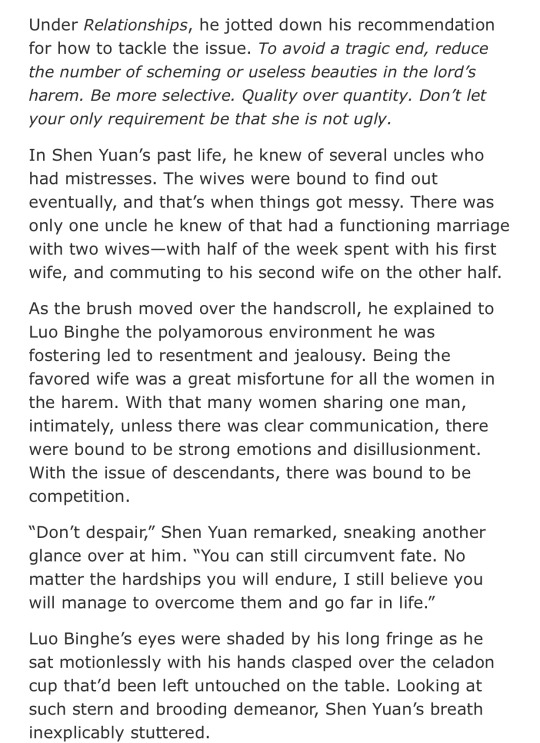
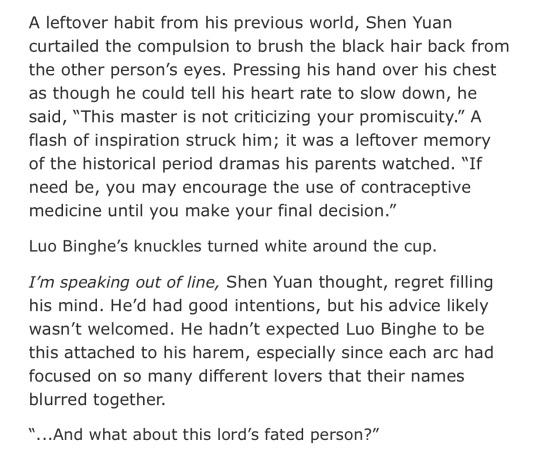
(Excerpt III - ch2)
Contrarian Tendencies
You know the saying: Monkey see, monkey do? In my case, it’s monkey see, monkey do not do.
A little fun fact about me as a writer: if I have already seen a fanfic where someone has already written a concept or idea into their story, chances are I will just avoid it entirely in my own stories. I don’t know why this aversion exists, but I’m assuming it’s because of my counterculture hipster inclinations and an intrinsic fear of plagiarism which has been beaten into all of our skulls since adolescence. There’s nothing wrong with being inspired by other people’s works. Technically everything’s been done before in writing so, as a writer, a good rule of thumb is to always try to give it your own unique spin on things. So for me, my brain somehow interpreted this a step further. This is a reason why I try to avoid reading stories from whichever fandom my WIP is from during the writing process of updating a fic, because this is how I get influenced. Once I see an idea or interpretation from another fanfiction, it influences me to not want to write it into my own. This is a very strong unconscious impulse for me. I guess this is just the neurons in my brain’s thinking that this way, it won’t be something my readers will have read before and the story idea will come across as different or fresh, and mine. In a way this is also how I show respect for fanfiction writers in the same fandom—by being inspired to not be inspired, ha. I like to think every story in the world serves a niche audience, so seeing a diverse range of originality and interpretations in a fandom is a good thing. This is also how I feel when I am able to identify certain popular tropes or depictions or patterns in a fandom; 99% of the time, it makes me feel a compulsion to “go against the grain” or write the opposite. For example, you have no idea how long it took me to come around the idea of incorporating the fanon “A-Yuan” into TUT. However cute it is, the moment it dominated the fandom (well, “dominated” is an exaggeration; it’s more like I’ve seen enough, especially in the Original LBH/ SY | SQQ tag), my gut reaction was to nope out of using it. But after seeing a lot of comments in my inbox with readers affectionately calling SY “A-Yuan,” I’d contemplated it for a long time and it wasn’t until ch4 that I decisively decided that yes, I can have Bing gē calling SY “A-Yuan” in TUT—but it has to be at the right moment for maximum dramatic and emotional impact. (See this thread that started it all. And this is the small sneak peek I wrote where LBH will call SY that for the first time.) <- This is the rare 1% where I actually conformed to what’s popular.
In this case, when I finally decided to expand the prologue into a full-blown story, coincidentally I had just recently read a good Binggeyuan (Bingyuan) fanfic which featured a kidnapped Shen Yuan interacting with Bing gē’s harem and LBH’s children/descendants. I’d liked their portrayal and even thought the children were cute. <- However, with me having reading this, the problem came up: I felt the familiar stubbornness in me rearing its head. So knowing myself, if I had included children, it is very likely the direction that I would have gone down for TUT would have been the opposite. To further complicate matters, you have to keep in mind the kind of writer I am. I tend to like grounding stories with a semblance of realism, no matter if the genre is pseudohistorical fantasy, romance, sci-fi, etc. And this writer has seen and read quite a few harem and palace intrigue Chinese dramas/ premises.
For further context, in those types of “historical” C-dramas^, in that sort of environment which fosters scheming, competition, jealousy, etc, it is almost expected to see heirs aka children aka descendants harmed along with the women. Innocent parties are often victims in these sorts of cutthroat premises, to underscore the underlying message the show or novel wishes to present. (See Ruyi’s Royal Love in the Palace. See Yanxi Palace. See The Legend of Haolan. See Nirvana in Fire. See The Rebirth of the Malicious Empress of Military Lineage. Etc.) And me being me, this would be the direction I would take. Remember, while TUT is meant to emulate a legitimate danmei C-novel reading experience in a fantasy world, I do drop pseudohistorical and cultural Easter eggs into the story. So trust me when I say you would not like the direction TUT would have gone down in, had I made LBH have children with his harem. I mean, theoretically yes, we could’ve seen endearing children characters from me, but you would have also seen me addressing a lot of the baggage that comes with (see Comment III Excerpt down below).
The situation with dissolving Bing gē’s harem is already complicated enough. As his romance with Shen Yuan develops, I didn’t want to have an additional headache thinking about how to address the issue of LBH having children already. Divorces in a pseudohistorical context is already a heavy topic—even more so when it’s divorces with children in the mix. Naturally I will still have SY and LBH eventually discuss the matter of legitimate heirs since LBH will essentially become the Sacred Ruler of all Three Realms and it’s a traditional precedent for an emperor to bed his empress, noble consort, and imperial concubines until he has his heirs (plural, because the rate of mortality was high in ancient China). In TUT’s case, at that point in the story SY will remind LBH that he’s essentially an immortal sovereign so there isn’t any need for an heir unless he wishes to retire. Furthermore, he will inform LBH that he could set a new precedent since he’s already different from the other emperors from history (with him being of half-Heavenly Demon and half-human cultivator lineage); as long as LBH is fully aware of all perspectives of the situation, he doesn’t necessarily need to conform to all traditions if this is something he really feels strongly about. But this future conversation(s) is likely the extent of it.
But wait, you say, what about a certain someone who’s going to be transmigrated as an imperial crown prince? Isn’t he going to be in that sort of vicious upbringing? <- Yes. But that’s an entirely seperate matter. In a way, since I’ve decided Bing gē will not have had any children or descendants in TUT, with Airplane, this now presents an opportunity for me to show the consequences of being one of the many children of an emperor with a harem of women vying for one man’s attention—and the power struggle that’d ensue in this kind of environment. It’s an interesting What-If parallel, if you think about it.
AO3 Comments
Although these are just small excerpts from replies I’ve written before, it’s nice and orderly to just compile them here for everyone since these will be buried underneath all the comments as TUT updates:
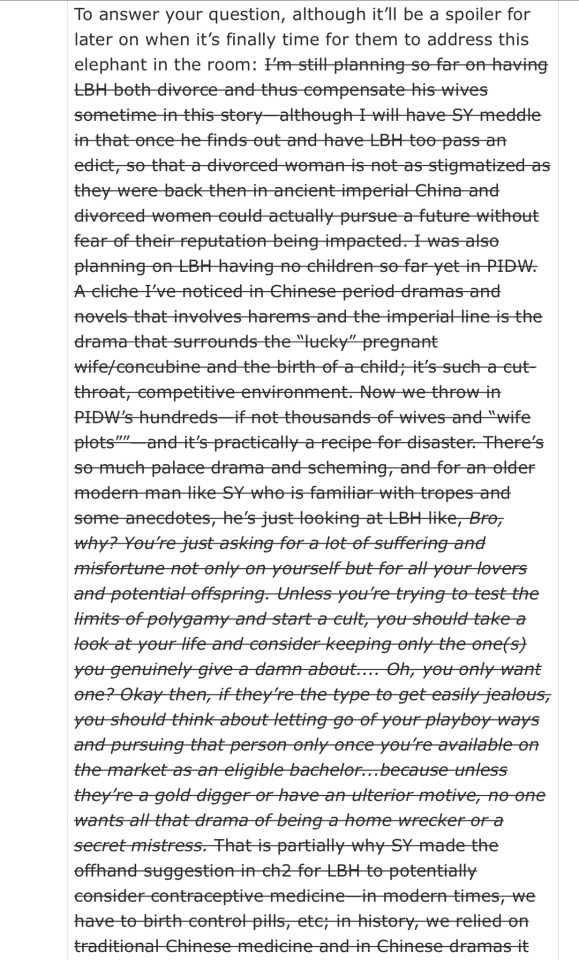

(Comment I- ch3)

(Comment II- ch4)
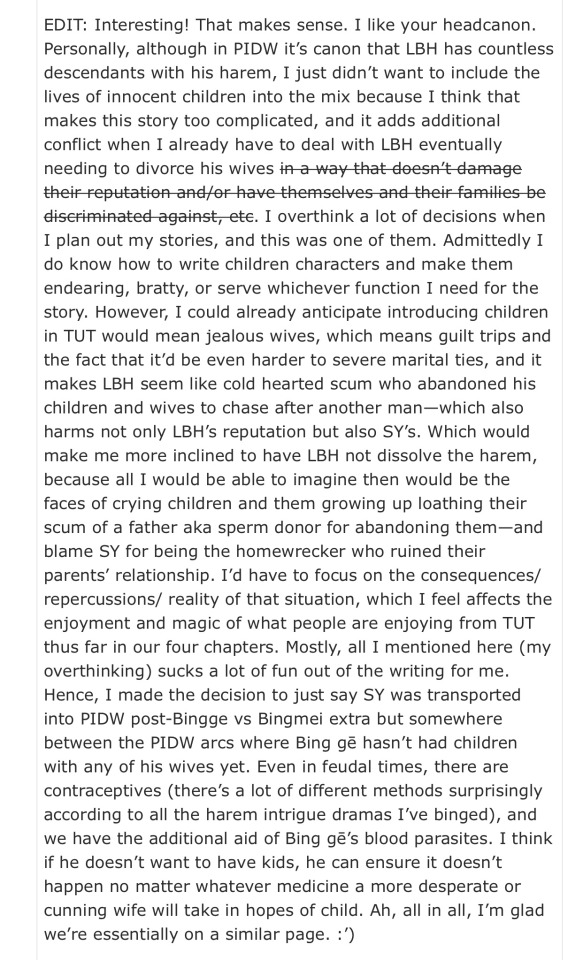
(Comment III- ch4)
Because of seeing comments that have asked me for my thoughts on whether or not I will include LBH’s children, I’ve had so much fun seeing theories thrown around: from LBH’s blood parasites being able to control conception, to someone’s headcanon about LBH being a hybrid and all that entails scientifically (think: mules). I will say in TUT, it’s more the former since in PIDW he’s supposed to have descendants; we’re pretending Bing gē doesn’t have any yet (and now definitely won’t, especially after having heard SY’s “prophecy”) because he subconsciously does not want children due to certain fears, trauma, etc. And his Heavenly Demon’s “blood parasites” (blood manipulation) is a convenient story device to explain why no wife has gotten pregnant yet.
I hope this explanation makes sense! Mainly I just wanted to have this archived on tumblr so that I have this post to refer to moving forward.
On a side note: especially since ch4 had been posted, quite a few people have actually mentioned they’ve read my replies to other comments and/or I have seen different people having hopped onto other readers’ comment threads (for example, imagine my pleasant surprise when I saw a reader you lovely person, you helpfully jumping in to respond to another reader’s questions about TUT, and their answers were actually aligned with what I would’ve answered!), so it’s always such a thrill whenever I see this level of engagement happening. I can’t explain why, but seeing this happening is just so cute to me. It really makes this writer feel so warm and fuzzy inside!
#svsss#bingyuan#bingqiu#the scum villain's self saving system#luo binghe#the untold tale#phoenixtakaramono#ask#technically not an ask#but i like to categorize it there#I mainly wrote this lengthy explanation on tumblr#bc I wanted to link this as ref#anytime someone asks me in the future regarding LBH’s kids#lol it’s actually not cinnabar pills hidden in a bracelet#it’s some sort of seeds which supposedly stopped concubines from being pregnant#I discovered this when I rewatched Ruyi’s Royal Love in the Palace#Do you all notice you have a unique writing syntax/ style#that’s how I can identify that you’re all diff ppl in the comments#one time an anon guest wrote something for G&G#and in the comment thread as another guest anon they supposedly agreed with the prev anon#in that case it was obvious it was the same person pretending to be another guest anon#and I can tell because their writing syntax/ voice is identical#which is why I’m so pleasantly surprised to see this phenomenon in the SVSSS fandom#you all have diff writing syntaxes#seeing you all interact with each other’s comments or my comments to other comments#is just such a delight ahhhhhh#I love the SVSSS community#you guys are so warm and welcoming
35 notes
·
View notes
Text
Colonization & Imperialism in ATLA
One of the things I’ve noticed in fandom complaints about the ATLA comics-- namely, “The Promise”-- and subsequently, LOK’s worldbuilding, is the way the narrative handles colonization.
I see a lot about how what the Earth Kingdom chose to do with the former colonies is “none of Zuko’s (or Aang’s) business.” (I also see people talking about how Katara would never support colonialism, in any shape or form, no matter the circumstances.)
And I just.... don’t vibe with those ideas? At all?
Like, I definitely have problems with the comics-- especially “The Promise,” where all the drama centers around Miscommunications of Epic Proportions and could have been resolved in Part One if all the characters just sat down and listened to each other (not to mention that Aang would never have agreed to make that promise, nor would Zuko have asked it of him (Sokka would be a more obvious choice, but that’s a different discussion))-- but I never had any issues with their worldbuilding.
I love the idea of Yu Dao, and the fact that the narrative acknowledges that a new kind of world has new kinds of problems. It makes sense to me that we can’t always just “give back the land we took.” And I found the idea of the end solution being “give the people who live there their own country” really cool and empowering.
So I want to talk about why I feel this way. About what kind of real-world parallels can be made here. About some little-known bits of world-history that compare.
(Please note that for this meta I am only going to be discussing the relationship between Fire Nation and the Earth Kingdom. As far as I am aware-- and I could be wrong-- there is no real-world genocide quite comparible to what Sozin did to the Air Nomads, and most of the people alive in ATLA were not actually around for or involved in that. And the relationship the Fire Nation has with the Water Tribes-- and that the North and South have with each other-- is worth a whole separate analysis, and doesn’t deserve to just be shoved into this one.)
(Disclaimer: While this is in response to some of the interpretations I’ve seen on this site, it is not meant to discount or invalidate those fans’ views-- I’m just trying to show my take on it. I am a firm believer in the power of active discourse, and the value of looking at the same scenes through different lenses, rather than just getting one opinion and accepting it as Absolute Truth.)
The main thing I notice in general ATLA discourse-- and not just on this topic, but in any sort of meta about the Fire Nation, colonization, and global impact-- is that the fandom mostly compares the war and its after-affects to real-world Imperialism, the Age of Imperialism, New Imperialism, and Colonization.
And I understand why that is. In the grand scheme of world history, that era is still fairly recent, and we are still dealing with the afteraffects from it. It has shaped the Western World’s worldview on every level. (Not to mention that the Euro-centric way we’re taught history means that this piece of world history is the one we’re most exposed to, and so have the most understanding of and room to analyze/criticize.)
However, there are a few issues with sticking only to this perspective.
First off, the Age of Imperialism was a direct response to the Age of Exploration. This was the period of time when white Europeans sailed around the world acting as though they were discovering new places and pretending that there weren’t already existing civilizations there.
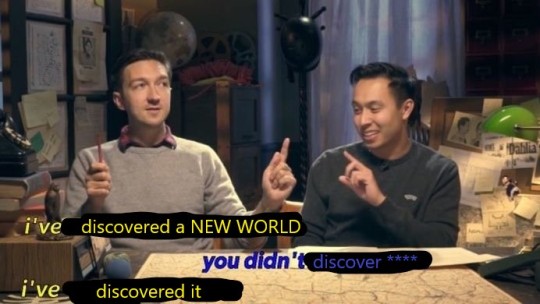
[ID: Two dots meme, edited so that Guy A says “i’ve discovered a NEW WORLD,” Guy B replies “you didn’t discover ****,” and Guy A insists “i’ve discovered it” / End ID.]
Now, I’ve mentioned this in passing, but the world of ATLA doesn’t appear to have had an Age of Exploration. There’s no vast “undiscovered” land masses, the four nations have always known about each other, and they all have a shared language.
The whole foundation for the Age of Imperialism was “oh, look, there are all these ‘unexplored’ lands with resources ripe for the picking (who cares about the indigenous people, they’re just simplistic savages who don’t know what’s best for them), let’s see which European country can grab the most land first.”
This was a race. This was sudden. This was Europeans coming in and taking over while viewing the natives as bothersome pests. This was about multiple major world powers competing over resources.
This was not 100 years of active warfare between a single conquering country and the very people they were trying to conquer.
The parallels don’t hold up.
Secondly, by focussing only on this one kind of historical narrative, we ignore any others.
I will admit that I have used the word “imperialism” in reference to the Fire Nation a time or two. However, upon further reflection, I realize I didn’t really mean imperialism, which is actually a fairly modern concept. What I feel the Fire Nation is really an example of is centralism and expansionism-- two ideaologies that have been a way of life for conquering empires throughout history.
(I am in no way qualified to explain the differences between these concepts-- I recommend doing your own research if you’re curious.)
The Persian Empire. The Greek Empire. The Roman Empire. The Byzantine Empire. The Mongolian Empire. The Russian Empire. The First French Empire.
You could take any of these (or numerous others) and make an interesting analysis between the similarities and differences between their behaviors and that of the Fire Nation. And maybe I’ll do that someday.
However, I started this to talk about Yu Dao and all of the other so-called colonies (I really feel like territories would be a better word, but, again, that’s a whole ’nother discussion), and I’d like to focus on that.
FYI, here’s a basic history refresher: If two countries are at war, and then they decide to end the war, neither country is required to return captured territories. They can make a treaty and agree to do so, but there is no obligation to. The Fire Nation didn’t just march in and say, “this is our land now”-- they fought for it. They captured that land. Just because the war is over doesn’t mean they need to just give it back.
Like it or not, that is the way the world operated for thousands of years, and so that is the interpretation I’m working with here.
In any case, “The Promise” actually presents this as a three-way conversation. There’s Zuko (and, by default, the Fire Nation), Kuei (and, by default, Ba Sing Se and the Earth Kingdom), and the people of Yu Dao themselves.
(My understanding of the Earth Kingdom’s style of government is that it’s made up of a large collection of different ethno-cultural regions who all answer to Ba Sing Se.)
I’ll let Sokka explain it:

[ID: Comic panel from Part Three of “The Promise.” Sokka and Katara are talking, both in obvious states of agitation, while Suki and Toph are looking at something in the background. Sokka is saying, “Let me see if I got this. The protestors and the Earth Kingdom Army want the colonials to go, the Fire Nation Army wants the colonials to stay, and the Yu Dao Resistance just want their city to be left alone?” Katara responds, “Yes!” / End ID.]
The people of Yu Dao don’t care about the war. They don’t even really care who’s in charge. They just want to be left alone.
This speaks to me on a very personal level, so I’m going to make another real-world comparison here:
My ancestors first came to America to escape from the poverty and opression they were experiencing in a place known as “White Russia”-- that is, Belarus. To be clear, I am not talking about the country “Belarus,” but the region, which includes the modern-day countries of Lithuania, Ukraine, Belarus, Latvia and Moldova, as well as parts of Poland and Russia.
I looked up White Russia, trying to find out how much information someone who didn’t grow up hearing stories about what it was like (that is, most of the people reading this,) might have. I didn’t find much. Most of what I found talked about political ideologies and such-- things that your average poor peasant, struggling just eke out a living, didn’t have much energy to care about. So let me paint a(n oversimplified) picture for you.
Imagine you’re a poor shoemaker in a small town on the Russian border. You spend your days hard at work, trying to earn a living to support your wife and nine children. You’ve never left the town you were born in. One day you get the news: Russia and Poland are fighting again. Your two oldest sons (ages 15 and 17) are forcibly drafted off to fight in the Russian army; you never see them again and have no way of knowing if they’re dead or alive (they’re probably dead). Poland wins-- this time. Congratulations, your town is now part of Poland.
Does suddenly being Polish make a difference to your life? Not in the slightest. Two or three years down the line, you’ll go back to being part of Russia again. This is the third or fourth time you’ve seen your town switch hands, and you can’t say you prefer one government over the other. It doesn’t really matter who’s in charge-- you’re still faced with crippling taxes, forced drafts, and various other forms of oppression. (It doesn’t help that you happen to be part of a persecuted minority.)
(This is why I have many ancestors who may never have left the town they were born in, and yet records show that they were born in one country, got married in another, and died in a third.)
This is the kind of worldview through which I am looking at Yu Dao. (Obviously, it’s not an exact parallel, but neither is the standard “colonizers vs oppressed natives” lens.)
My ancestors eventually got fed up with the treatment they were receiving from their respective governments, and left to build a new life, in a new place. But the citizens of Yu Dao don’t have anywhere to go. The only two real world powers in this story are the Fire Nation and the Earth Kingdom, neither of which has ever before expressed any true interest or concern in the actual people of Yu Dao.
The Earth Kingdom didn’t really care about the city before the war-- they were just another poor, struggling town, whose citizens were barely able to make ends meet. And while the Fire Nation may have helped the place grow into a bustling town, they also established a hierarchy that did not serve in the citizens’ best interests.
And so, in “The Promise,” these citizens’ frustrations come to a head. “Enough,” they say, “we don’t want to be used as a pawn in your games anymore.”
And Zuko and Kuei (and Aang) actually listen. They say “we need to start thinking about these people as people, not as symbols of one side or the other. It’s time to give them a say in their future.”
And a new country-- a new way of life-- is born.
(Is it perfect? Absolutely not. But it is constantly evolving and changing, trying to do better, be better. And that’s more than you can say about most of the other countries in this world.)
#avatar the last airbender#avatar comics#the promise#meta#yu dao#fire lord zuko#fire nation#earth king kuei#earth kingdom#colonization#history lesson#imperialism#expansionism#centralism#real-world parallels#united republic of nations#thoughts#this is just my take#alternate opinions are valid#food for thought
87 notes
·
View notes
Note
Yes, the weak writing in TOA is what mellowed me out on the series. Despite my distaste for all the decisions after the first third of the movie I can't say it disappointed me because no matter how excited I was I didn’t have high expectations because I know what it's like. It's funny because I never completed the series. I got through half of Trollhunters and 3lbelow before I just had to leave. It took me a month to finish Wizards and that one's my favorite. So yeah.
(Following on from this ask.)
That's fair. Like I said before, I'm in a pretty similar boat when it comes to Tales of Arcadia. Trollhunters was good and - barring a couple of episodes which I fast-forwarded through because the tropes/ execution of the premise wasn't for me - I had a really enjoyable time with it. But then it reached the end and it felt like there were a lot of questions (changelings etc.), worldbuilding (heartstones etc.) and general complexities (Merlin as he was talked about throughout the series vs Merlin as he appeared at the end) that were left hanging to a frustrating degree.
Now, in fairness, I tend to experience "wait, that's it?"-ism at the end of a lot of TV shows that run for more than a single season - it's probably just the nature of the medium/production environment that makes it hard to match the impact of hours of build-up in just a handful of final episodes, especially since a lot of shows won't know they're on their final season until that season - but with Trollhunters, it was a very intense feeling of "wait, that's it?".
Part of the reason why I initially watched 3Below was that I had hoped it would continue building on the unanswered lore questions from the first series (a fairly common thing for sequels/ spinoffs to do) but instead it took a hard right-turn into aliens and sci-fi. And - much as Douxie is probably my favourite ToA protagonist - by Wizards it became clear that even when we were going back (heh) to the more Troll-adjacent fantasy world, most of those questions still weren't going to be satisfyingly answered, if at all.
Part of me wonders if this might be a small blind-spot of Del Toro's when combined with Netflix, since outside of ToA most of his resume is film, and film has different structural/ worldbuilding/ storytelling conventions due to the much shorter run time. A 'film ending' would probably feel underdeveloped at the end of a TV series because shows by necessity have to add and flesh out more concepts to fill their run time. Just speculation through.
By about halfway through 3Below I was definitely watching more out of a sense of analytical curiosity and 'might as well see it through' than because I was still invested and suspending my disbelief. If I'd made it dedicated watch (rather than something to have on while sewing the Purrloin Plush) I probably would have stopped at about midway through 3Below, so I totally get where you're coming from with that.
As a sidenote: The way Wizards handled the Merlin/amulet/Morgana's-hand point from Trollhunters felt almost like a cop-out to me. Like they were trying to walk back/ distance Merlin from the morally callous nature Trollhunters both showed and suggested in some antagonists' dialogue, by making it seem like far less of a deliberate scheme from him, having her turn 'bad' for unrelated reasons ahead of time and someone else being the one to actually cut her hand off. Which kind of retroactively makes it weird that she claims he "took her hand" in the first series. That line made it seem more morally complex (that maybe she became a villain' because she was directly betrayed/ wronged by one of the heroes) but then her character gets weirdly flattened. Tales of Arcadia's moral stance on Merlin is just very unclear and strange in general.
With all that said though, I think there is value sometimes in going in to something with no expectations - or knowing/ expecting it to be bad - as an exercise in analysing storytelling. One upside is what you said; because you're not really invested/ aiming to become invested you don't end up being as disappointed by bad writing. (It's that weird sort of optimistic pessimism - if you expect the worst then you'll either be right or pleasantly surprised).
Consuming media with the intent to dissect it from the start does give a different experience... but then again no-one watches True Crime Documentaries or Mayday: Air Disaster because they want to experience a perfectly normal day where everything goes well and no-one gets hurt. Some days you just want to watch a train wreck in slow motion and try to work out what went wrong.
I actually did this with Dreamwork's Voltron - I went in having already read discussions, watched a full analysis and knowing it was going to go downhill, because I was curious to see how it was going fall apart so thoroughly that the fandom almost unanimously agrees that it's a mess. Funnily enough I was kind of surprised: not because it wasn't bad (although the first three seasons are genuinely fun) but because it got bad in ways I didn't expect. Most of the discourse I had seen was ship-related so I'd sort of expected a generically mediocre story with some 'Kataang vs Zutara' level character chemistry fanning the flames, but no - the central narrative and structure of Voltron just completely falls apart. It's wild.
And - much as it's always is sad when a series doesn't live up to it's potential - I kind of prefer when a story 'shows its hand' so to speak fairly early on in terms of writing weaknesses. For me, it's almost more tolerable to see the flaws and accept that you have to look past them as the price of entry. It lets you manage your expectations - you're consuming the story in spite of known problems, so it doesn't feel as bad if/when those flaws get big enough to make the story not worth continuing with.
Call it honesty, or maybe just closure, but I'd rather a series that's kind of stupid from the start to one that starts off strong/competent and then gets really unexpectedly stupid all at once. The former tends to sting a lot less.
#trollhunters#trollhunters: rise of the titans#tales of arcadia#Really starting to make me realise I have a strange relationship with ToA#I don't dislike it. but. I also don't feel any surprise that the flaws that were there right from Series 1 toppled it#It could have been better#and it's sad that it wasn't#But it's also kind of exactly what I knew I signed up when I continued past Series 1 despite my feelings about those flaws#So I don't feel mislead or like it in any way made a false promise about it's trajectory/ themes/ quality#(You already know which series I DO feel that way about)#also I feel like the way each Series ends with characters from the next series popping up to help with plot feels too Deus Ex Machina#Definitely the worse offender was when Aja and Krel just showed up and solved the Lightning in a Bottle puzzle for the Trollhunters gang#At the cost of building any metaphorical answer or having Jim Toby and Claire do proper problem solving#Aja and Krel were such a weird way to handle it since it didn't even really build much mystery for who/what they were#3Below kind of makes it better in retrospect but in Trollhunters it's still 'weird exchange students show up with solution just go with it'#very strange choice#Voltron is the only series where I got to the point of saying 'I give up' 'I cannot tell what will happen next' OUT LOUD while watching#ATLAS turning into another robot very much broke my brain and punted the remains of my suspension of disbelief into the sun#youmaycallmeyourhigness#3WD Answers
11 notes
·
View notes
Text
My Thoughts on KIPO

This post serves two purposes: first to give my thoughts on the third and final season of KIPO, and second to also address the show as a whole. Be advised, because this is the final season and the story is now over, I will be getting into MASSIVE spoiler territory. THIS IS YOUR FINAL SPOILER WARNING.
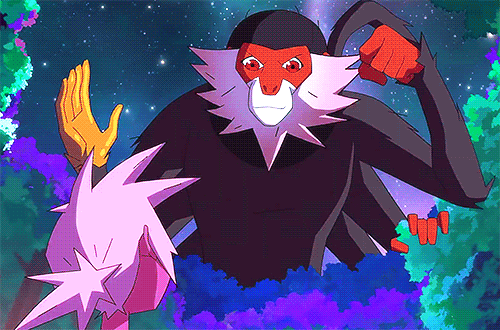
The Good
I am so happy they kept Dr. Emilia unredeemable, and in a good way. With shows like Naruto or Steven Universe where the MC has a weird knack for befriending the worst monsters in the universe, Kipo helps subvert this by doing with Dr. Emilia what SU should have done with White Diamond. They made her an antagonist the talk no jutsu MC couldn’t just reason with, showing that even non-violence can only take you so far. I like that Kipo still tried to give Dr. Emilia a chance, and her ultimate fate is largely her own fault, not something done to her by Kipo.
I liked how for the most part, no two antagonists were won over the same way. Zayne was won over by a legitimate friendship with Label. Haugh was won over by seeing his daughter dance with the Korean pop band narwhals, Daugh was won over by meeting the Korean Narwhal leadsinger and seeing all of the prisoners in Dr. Emilia’s lab. Even Greta was won over by Wolf just asking her “what do YOU want?” and letting her do it. And the rest were won over through PRAHM.
The solution to curing Kipo’s mother was a stroke of brilliance. I didn’t see it coming until seconds before they did it, and I loved it. Getting to see Kipo and her mom hug was just so wholesome it melted my frozen tiny little black heart.
Speaking of Song and Leo, they remained relevant! Look at that. A young character hero’s journey story where her parents remain important supporting cast characters through the whole thing.
Between seasons 2 and 3, they confirmed that Asher was non-binary, and I liked that we saw that in their hairstyle change for this season. I appreciate that the cut didn’t seem overly masculine or feminine.
Dave... actually earned my respect. Kinda. At least, it explained why he’s such a self-centered asshole in season 1. He’s used to being the leader. So that gave me some new respect for him.
I LOVE that Hugo was forced to see the ruins of Aurum and the self-reflection he shares with Wolf is just icing. Speaking of Hugo, his redemption is handled really nicely. The trial and error, the old habits that are hard for him to break, Kipo easily keeping him in line, and his slow work toward being a better mandrill. He felt like he was growing a lot.
When Wolf is deciding what to do about Margot, Kipo aggressively supports her, waiting for Wolf to ask her for help, and then decreeing that only Wolf has a right to decide how she wants to handle this situation. You go Kipo. Getcha woke on. Speaking of Margot.
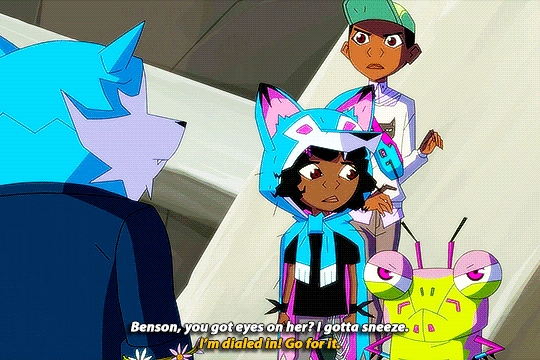
The Bad
Margot might as well have not shown up. We learn nothing new about her, nothing new about Wolf, and then she just gets cured by Emilia so there’s never really a resolution to this character tension. I get the reason why, I just praised it in the above section, but this was still poorly handled in my opinion. Their just isn’t enough story payoff to bother dragging this out of the backstory.
Dave created Skyscraper Ridge.... for a battery-powered hand-held fan? Which survived for 200 years of battles between humans and mutes. Over a hand-held fan? Dave and Benson met... by fighting over a hand-held fan? I’m sorry but what the fuck? If you wanted me to take this seriously, you should have made it about something important. Now, I will give this some credit: Maybe Dave has dementia and is misremembering the item he’s talking about. Cuz Benson doesn’t know what he’s talking about at first. So maybe he’s using a toy fan in the place of the actual thing they were fighting over.
Speaking of Benson... You don’t make a backstory episode that raises more questions! Why is Benson the last of his kind? What happened to his parents? Did Dave kill them? Cuz if he did, that’s seriously fucked up that Benson’s best friend killed his parents.
Song just kinda stopped being important once she was human huh? She spoke dubstep to the bees and got the death ivy wall put up, and then said she was going to work on a vaccine to the Cure... and then never finished it. Five years later, and Yumyan and all the others are still Cured. I get why this is, it’s so that there’s lasting consequences, which YES. Good on Kipo for not wimping out and pulling its punches, gimme them lasting consequences baby! I feed off it. But again, this leaves Song kind of … irrelevant.
So Kipo turns into a Mega Jaguar and she runs on all-fours (well... sixes), Song has the anatomy of a Mega Monkey... but Dr. Emilia’s Walrus form... has arms and legs? Sorry, that just kind of breaks the immersion for me. Two megas follow a consistent world building mechanic: you adopt the features of your mega animal... and Dr. Emilia just... doesn’t. No sir, I don’t like that.
Kaiju battles are kind of lame. There I said it. Come get me, Internet. I’m not apologizing. I don’t care much for great big things beating up other great big things. Now with a show and world like that of Kipo, I fully expected there’d be a Kaiju battle at some point, and with Kipo being a mega jaguar, I get why they went this route, but even so, Kaiju battles just aren’t my cup of tea.
Why did Hugo have to die? It kind of smelled of Redemption Equals Death, a wholly loathsome trope. He went through the best arc of all the characters, so let’s axe him off in the end. Sure, we lost other characters we cared about. Yumyan, Collette, Brad, but this was deliberately a noble sacrifice, and one he didn’t really have to make. He could have just jumped out of the car before it ran into Dr. Emilia. I don’t approve of killing off Hugo. That was not the right way to end his story.
Who is Wolf wearing? It’s never explained to us who this wolf was to her. It’s just a wolf. But this wolf was a person. And now she’s wearing its skin.

The Meh
So Jamack is here. That’s pretty much it. He finished his character arc when he joined Puck’s minstrel show and now he’s all smiles and buddy buddy and there’s not much else to say about him. I’m glad he was part of the final battle against Dr. Emilia, but by season 3, Jamack is just another ally. There’s no more of that redemption arc, which makes it feel slightly flat. For what we got, his redemption arc was alright, but the vast majority of it happens off screen, so unlike Hugo, it just doesn’t have that satisfying crunch.
So, ever since Mullholland, I’ve been under the impression that Wolf likes Kipo. Then with Kipo at the PRAHM very verbally saying she wishes Wolf was there, I thought maybe they were a ship? In the end, they verbalize having a sister-like relationship, which I totally get. I’m fine with it. That’s why it’s in the Meh section, not the bad stuff. But if they wanted to hammer home the sisters angle, having a character at a dance wishing the other was there doesn’t exactly send sibling energy.
I kind of wish we got to see how the first burrows got formed following the appearance of mutes. That would have been a nice thing to learn.
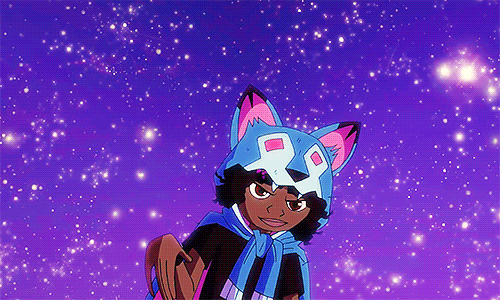
Final Thoughts
This show is probably in my top 10 cartoons of all time. It’s funny, colorful, the music is amazing, the characters are great, the villains steal the show, and it’s a good story. Is racism solved a little easily? Maybe, but A. it’s a kid’s show, and B. it’s kind of the whole point of the show. Unlike say Star Vs where it was a show about a princess who doesn’t want to be queen ohandalsomonsteracismiguess, this show’s core focus was on prejudice and racism. That was the forefront topic of the show. So, I’d say it sends an important lesson. I’d even go so far as to say it may be this generation’s Avatar. Is it as good as Avatar: the Last Airbender? Mmm no. But it’s damn good. Even with it’s flaws. I’d probably rate it about an 8.5 out of 10. So about a B+. Which is still really good. Does it have a few problems? Yes. Most shows do. It’s not perfect. But at the end of the day, it’s still a good show, and it has a LOT of rewatch potential, which is good for any show.
#kipo#kipo and the age of wonderbeasts#kataow#kipo oak#kipo season 3#kataow season 3#scarlemagne#wolf#david#benson
79 notes
·
View notes
Note
ive been following u for idk how long and i DONT want to come off as a weirdo hate anon (feel free to delete this immediately) but man……. yes it sucks what theyre doing and you have the right to complain and bully strawmen but ultimately it’s the company’s fault and the problem lies in only two companies controlling the phone/tech market so you only have two choices. it shouldnt be apple vs android and thats it. its not the fault of some random ppl owning an apple product. even if a hundred or a thousand people stop using apple products in protest theres still gonna be demand for it and they wont go ‘oh shit we gotta stop making phones.’ higher class ppl w iphones can SUCK it though i agree im only spiteful towards their asses
oh, no, you're right. due to capitalistic situation these days the average consumer may share a small bit of the burden, and assumingly unknowingly so, of the hell created but the majority of the fault does lay with the corporation itself.
but like. would you say this about chick fil a? due to an unshakable base (snobs and rich fucks for apple, christians and right wingers for cfa).... is it truly an infrequent visitor's fault chick fil a has money to help make being gay a crime punishable by death in the third world? not entirely, but the contribution mustn't be discounted. If only the core demos ate there, it wouldn't be a worldwide chain. but it is.
it's a tangled up, multifaceted situation that's not as easy to solve as saying "apple users of the world unite, cast aside your $399.99 iChains!" but if it was only small groups of people with them iChains we wouldn't be in this situation.
So I absolutely disagree with your premise - "random people who just happen to buy apple products" are in fact the reason Apple has vast fortunes and social power in the first place. And they use that money and power to do the things they do. it didn't just come out of nowhere. Enough "random people" own apple products that Apple can do literally Whatever They Want. And they do. I could go on and on about the ways they've fucked over the tech industry, enabled by the fact enough everyday people still buy their shit, but I'll spare everyone that post.
of course i absolutely am not bootlicking Android either. It's the better of the two. Still horrible. The fact there's no viable third parties is a chokehold on tech.
5 notes
·
View notes
Text
Ai yah, I really have to respond to this post again, huh?
Well, for starters, I apologize for a mistake I made in my original post. In the OP, I insinuated that the Princess Zeldas we see in the series could have possibly had a role in the atrocities committed by the royal family. This is incorrect, and it was poor wording on my part. I should have clarified my intentions when writing that particular passage; however, I felt it was unimportant, given that the point wasn’t solely about Princess Zelda, but how the addition of the Goddess Hylia and the Demon King Demise not only invalidates Ganondorf’s character up to that point, but adds much greater weight to the terrible actions committed by the royal family, especially towards the Sheikah.
Given that tumblr user lorelylantana is the third person to make a reply by discussing the reincarnation cycle, rather than the actual point of my post, perhaps I should have proofread and double checked my post before sending it out into the world to cause problems on purpose.
With that said, after I read lorelylantana’s response, I felt it necessary to make a proper reply of my own. It’s going to be a rather lengthy reply, as I have many things to say and many images to post.
However, I’m going to do all that I can to avoid discussing fanon or fan theories. I don’t mind them, but adding fanon wasn’t the point of my original post, and it shouldn’t have been the focus of the responses I received. I want to stay as close to the canon Nintendo laid out as possible. Thusly, my sources will strictly be drawn from the games, game manuals, Creating a Champion, Hyrule Historia, and Hyrule Encyclopedia. Despite the latter two being dubiously canon, they were approved by Nintendo, so they’re worth mentioning.
So, without further delay, let us begin.
- “The original post seems to be based on the idea that Zelda and the royal family of Hyrule are synonymous, which is questionable for reasons I’ll get into later.”
For all intents and purposes, yes. Zelda and the royal family are synonymous, as she is the face of the royal family in almost every Zelda game featuring her. Even if she isn’t the ruler of Hyrule in that particular moment, she is our figurehead for the monarchy, by all means.
- “The games don’t hand wave the actions of Hyrule’s royal family, they just don’t go out of their way to hold a young girl personally responsible for the actions of kings […]”
While the actions of the royal family are briefly acknowledged, as is the case with the Shadow Temple and the Arbiter’s Grounds, the monarchy has never had to answer for their actions. Even in the case of the Sheikah’s massive exile 10,000 years ago, the royal family never answers for this, nor are they ever portrayed being in the wrong. In fact, the event in question is only mentioned by a single member of the Sheikah in Breath of the Wild, Cado.

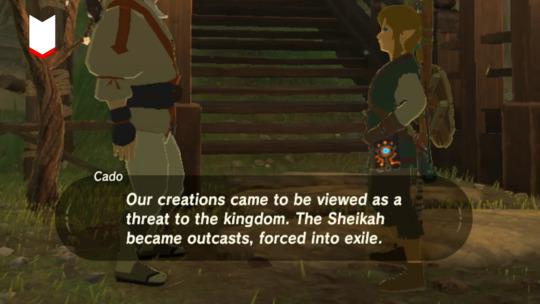
Image credit goes to YouTube user Macintyre.
The royal family’s actions are never directly described as “these were horrible things that happened.” Instead, it’s simply, “yeah, it happened.” There is no acknowledgement that the Yiga was created by the royal family’s own hands, nor is there any emphasis placed on the impact any of these acts have.
For example, the exile of the Sheikah wasn’t even the first instance of the royal family of Hyrule mass-exiling a group of people and displacing them from their original homes.
After the events of Ocarina of Time, Ganondorf is captured and executed for his crimes leading up to the events of the game and presumably the events of the Adult Timeline, given Young Link’s testimony. (I’ll get into why the King of Hyrule believes Link over Zelda later.) After Ganondorf was executed, the Gerudo were forced out of Gerudo Valley and banished from the Haunted Wasteland. Even during the events of Twilight Princess, the Gerudo Desert is completely abandoned. Once again, there is no discussion concerning the royal family’s actions, with the narrative instead being that the Gerudo, some of whom were actively against Ganondorf’s actions and many of whom were hypnotized during the events of OoT, are entirely at fault and have to atone for their sin of… having Ganondorf for a leader, I suppose.

Source: Creating a Champion, p. 405
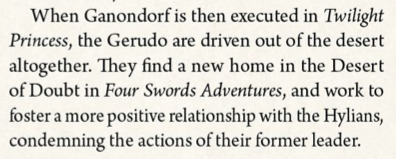
Source: Hyrule Encyclopedia, p. 46
The royal family gets to punish an entire people for the actions of one man. Rather than the act being portrayed as negative or even discussed, it’s hardly even mentioned.
While I’m aware Encyclopedia’s canonicity is dubious at best, its material was still approved for publication by Nintendo. Thusly, I feel it worthy to discuss.
To summate, the royal family did bad things, and very select few acknowledge it.
Next point.
- “I think that the Zelda/Hylia = good Ganon = bad situation serves a narrative purpose that justifies the black and white nature of the games because it highlights the shades of gray in between installments…”
The Legend of Zelda is almost thirty-five years old. This series should have long evolved beyond the black-and-white-morality narrative, especially when the side we’re supposed to sympathize with literally used the Sheikah to commit war crimes. You don’t have to have stark white and pitch black in order to see shades of gray.
- “… And trying to assign Zelda a dark side is kind of missing the point, especially when no one seems to question Link’s morality even though he’s constantly stealing people’s stuff.”
Examples of Consequences to Link Stealing People’s Stuff
1. In Twilight Princess, stealing from Trill will result in the bird branding you a thief and pecking you every time you come near him, which will only cease when you finally pay up.
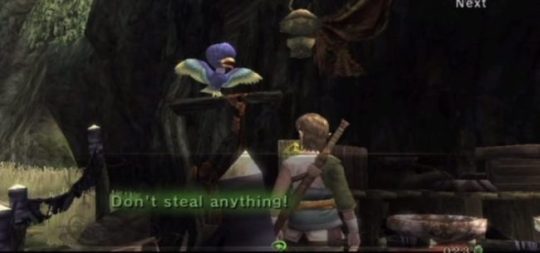
2. In Link’s Awakening, stealing from the old man’s shop will result in instant death the next time you enter his shop. If you steal, your name is changed to THIEF for the rest of the game.

Furthermore, Link is controlled by the player; thusly, his actions have no consequence to the story or Link’s character. Zelda, on the other hand, is an active participant in the story, whose actions and whose family’s actions weigh heavily on the games. That’s not to say Zelda is ever evil. However, as much as she is a victim of her own family’s history, she still has just as much power to change it.
- “If the games wanted to gloss over the sins committed by the royal family[,] they wouldn’t have designed entire dungeons around them.”
I reiterate: the sins of the royal family were mentioned once, and then immediately dropped shortly thereafter. It’s not there for you to dwell upon, merely window dressing as if to say, “Yeah, that happened.”
- “I believe The Legend of Zelda series is a critique of the Divine Right of Kings”
Until the events of Skyward Sword, the Hylian Royal Family wasn’t a divine lineage. A thirty-five-year-old series can’t be a critique of a concept that it barely even acknowledges. The only emphasis placed on the “goddess blood” part of the royal family is in Breath of the Wild, in relation to Zelda having to unlock her sealing powers. Despite the massive repercussions the revelation of the royal family’s lineage tying back to divinity should have, it’s barely even mentioned,let alone discussed.
As a side note, the divine right of kings specifically denotes that the monarch is chosen by God to rule. In contrast, the Hylian Royal Family continues to rule by, presumably, claiming lineage to the Goddess Hylia, which is closer to traditional practice in feudal Japan.
- “If the Divine Right of Queens is indeed present, does that justify a hereditary monarchy? As far as the Legend of Zelda is concerned[,] the answer is no.”
The Legend of Zelda series never questions the validity of the royal family’s rule.
- “Isn’t it funny that the Kingdom of Hyrule seems to be perpetually stuck in the dark ages?”
Ocarina of Time has neon lights, jukeboxes, and canned goods. The lakeside doctor’s chemistry is advanced enough that he is able to synthesize eyedrops. Given the newspaper articles strewn about shops, Hyrule also has pictoboxes in OoT.

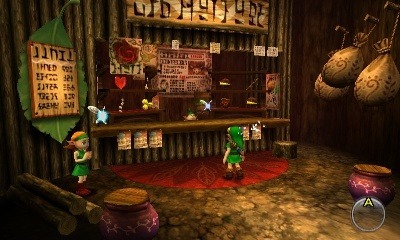
By Wind Waker, pictoboxes have evolved to print in color. In Phantom Hourglass, Linebeck’s ship is steam-powered.
In Twilight Princess, pictoboxes now print higher quality images. In addition, with the introduction of Malo Mart’s Castle Town branch, TP is confirmed to have fully functional electrical lighting in some places. Cannons are so safe, you can get launched out of one for fun. Pyrotechnics have grown advanced enough that explosives can function underwater, and Death Mountain has become a functioning, refined mining facility stable enough for Hylians to safely walk in. Also, Auru has a bazooka.
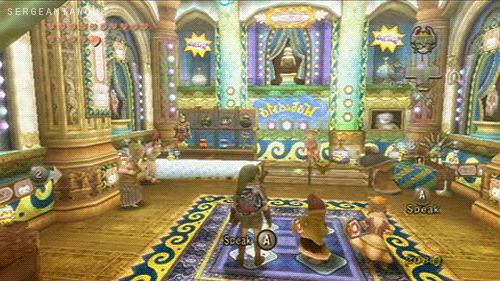
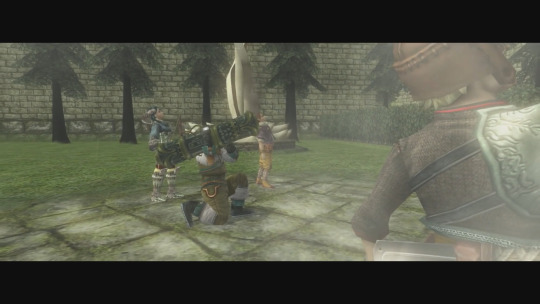
SPIRIT TRACKS HAS TRAINS. THEIR AESTHETIC DIRECTLY REFLECTS THE INDUSTRIAL REVOLUTION.
Hyrule is hardly stuck in the dark ages. It’s high fantasy.
Next point.
“For starters, I want to establish that I don’t agree with the assumption that what the Hyrulean Royal Family does = Zelda/Hylia would do. I don’t think it’s a mistake that almost every text in the OP explicitly mentions that it was a King that committed those acts, not Zelda herself.”
Once again, that was an error on my part. It wasn’t my intention to imply Zelda had any part in such actions. However, Zelda learns how to rule from her father, or her mother, or whomever holds the throne in that particular moment. These acts are never questioned in canon beyond “Yeah, that happened,” and the most conflict we have is the issues between Zelda and her father in Breath of the Wild boiling down to how to confront the Calamity—science vs. sealing magic— rather than anything else.
It’s a personal issue, and Rhoam treats Zelda terribly, essentially alienating himself from his own daughter and treating her as little more than a pawn. I agree that it’s absolutely terrible. However, that’s merely a personal issue. She’s complicit in how Rhoam addresses the Sheikah, possibly even fully aware of the anti-aging rune Purah was developing to force retired soldiers into battle against the Calamity, and from what we’ve seen in Age of Calamity, she doesn’t have an understanding of the Yiga Clan other than the snide remark Urbosa gives:

Image credit goes to YouTube user BeardBear.
It’s up to Zelda to develop a deeper understanding of her country’s history; not to take personal responsibility, but to understand where those who are suffering are coming from.
That said, acting with the Hylians’ best interests at heart is exactly something Hylia would do.
In the prologue to Skyward Sword, the Demon King and his army attack the Hylians, slaying many and throwing the world into despair. Thus, the Goddess Hylia saves the Hylians by sending a chunk of land up into the heavens, sparing them from the war to follow while she gathers every other race to fight alongside her.
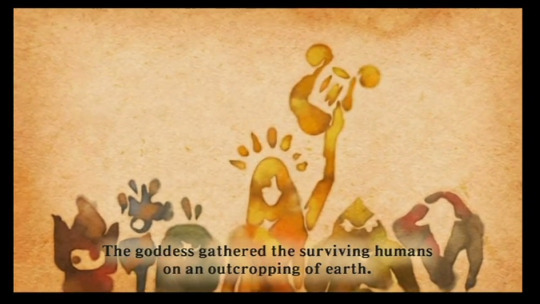
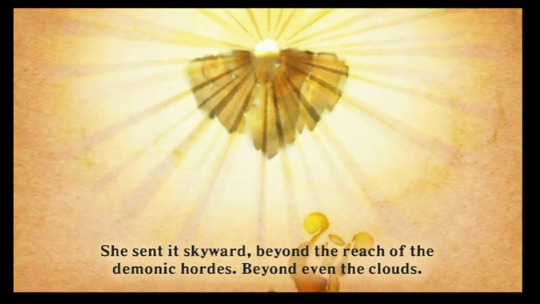

So… How come Hylia only saved the Hylians?
I understand many were wiped out by demons, but if Hylia was fully prepared to spare people from violence, why not also send small numbers of every other race? Why only save the Hylians, her chosen people, while essentially dragging everyone else into battle with her? Furthermore, when Hylia’s immortal body suffered grave injuries, she opted to take advantage of this by choosing to be reborn as a person. Not only is it explicitly stated that Hylia reincarnated in order to utilize the Triforce’s power, as she could not do so as divinity, but she knowingly chose to be reborn as someone who would become close with her chosen hero, in order to influence him to follow her plan without hesitation.
Hylia used Link.
That much is certain, and it’s laid out clearly by Zelda shortly before she takes Hyrule’s longest beauty nap.
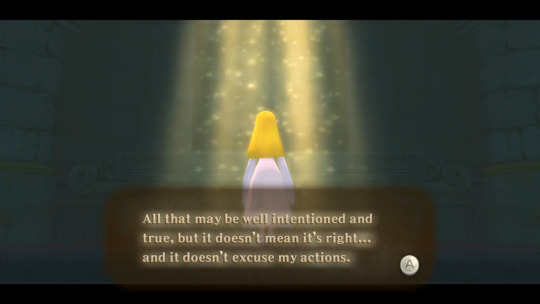
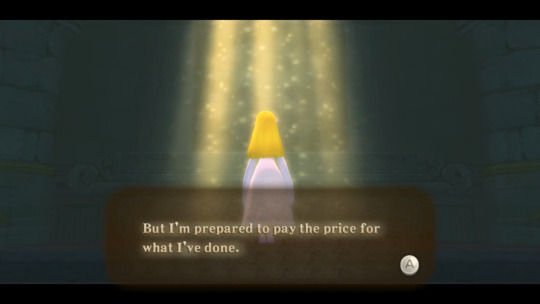

It must be noted that while Zelda states she is Hylia reborn, and has regained Hylia’s memories by this point, she still sees herself as a separate entity from Hylia. While she herself is immensely guilty and apologizing over and over for what she’d done in her previous life, we have no way of knowing if Hylia herself would react the same way.
In fact, according to a fan-translation by ZeldaUniverse user Yamikawa, Demise goes as far as to describe Hylia as “brave and so-prideful,” hinting that even a being who loved her chosen people so much to save them still saw them as beneath her, if being reborn as human is seen as such a drastic extreme contradictory to her supposed character. Now, this is merely reflection on the inner workings of the Demon King, so his word can’t be taken as gospel. But, like all things, I find it interesting.
From what I can gather, however, Hylia certainly cared more about the Hylians than any other being in the land of Hylia, not dissimilarly to the royal family.
- “I also don’t think that every princess Zelda is a Princess of Destiny or Representative of Hylia, I think that she reincarnates just about as often as Link and Ganon(dorf) do, because the logistics don’t really work out otherwise. This leaves hundreds, if not thousands of years where Zelda/Hylia isn’t on the throne.”
This is merely speculation. Moving on.
- “There’s a notable trend of the King of Hyrule getting in the way of Zelda’s attempts to save the kingdom. First[,] he doesn’t take Zelda seriously [in] Ocarina of Time, forcing her to rely on Link […] I don’t know why the King of Hyrule was willing to listen to a random boy claiming to have been from the future over his own daughter but whatever I guess.”
The King of Hyrule believed Young Link because he came back to the Child Timeline with the Triforce of Courage. Up to that point, the whole Triforce was supposed to be safely locked away in the Sacred Realm, which was supposed to be completely inaccessible without the spiritual stones and the ocarina of time, neither of which Link had. I’d listen to the kid’s story too if he came back with a God Dorito on the back of his hand.

- “And then again in Breath of the Wild when Rhoam bans Zelda from ancient tech research despite the fact that he has absolutely no reason to believe his pray the incompetence away method is the right one.”
The tapestry showcasing the events from 10,000 years ago depicts a princess possessing the blood of the goddess using her sealing magic in order to seal away Calamity Ganon. Link can swing the Master Sword at Ganon or whack him with ancient arrows or light arrows all he wants. Without the ability to seal away the darkness, as shown at the end of Ocarina of Time, all of this preparation and planning would have been for naught. That is why Rhoam is so harsh on Zelda. That’s why so much emphasis is placed on unlocking her power. Without it, defeating Ganon would be impossible.
On that note, Rhoam also had no idea what he was doing. Zelda’s mother was the one with the sealing magic, not him. She was supposed to be the one to train Zelda, but she passed away before she got the chance to even start. He puts so much emphasis on prayer rather than ancient technology because he genuinely doesn’t know what else to do.
I can’t believe this post forced me to defend Rhoam of all people I’m gonna have a stroke—
- “Also, this is purely speculation, but [I’m] pretty sure there’s an implication that King Daphnes Nohansen caused the flooding of Hyrule in Wind Waker […] This sounds like a wish on the Triforce that backfired[,] but I digress.”
Daphnes couldn’t have made a wish on the Triforce before Wind Waker because, when the Hero of Time left the Adult Timeline, that timeline’s Triforce of Courage shattered into eight pieces and scattered throughout the land—er, ocean. Even if he had Wisdom on him, Ganondorf still possessed the Triforce of Power when he was sealed away, and he wasn’t going to let go of it when he broke free.
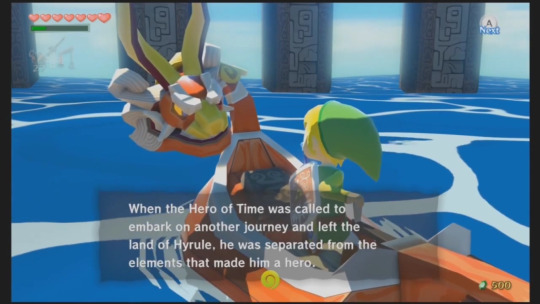
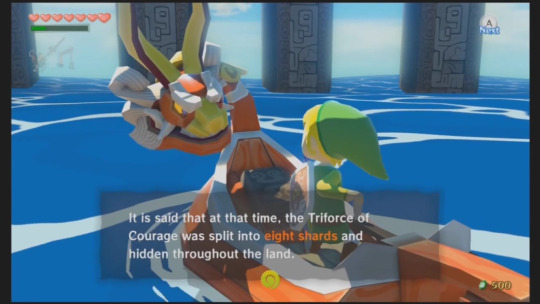

Besides, if Daphnes did wish on the whole Triforce, it would have disappeared. There would have been no Wind Waker.
- “When she saves Hyrule in spite of interference…”
I’m not even going to finish the quote because the entire paragraph is too much for me to unpack. I’m assuming they’re saying that Zelda is never the one truly in power, and the royal family takes advantage of one Zelda’s good deeds to get brownie points.
However, concerning the first line…
In Ocarina of Time, Zelda going behind her dad’s back to try to “save Hyrule” leads Ganondorf straight to the Sacred Realm. Even though a time paradox leads to everything turning out okay in the end, the bleak future was created because Zelda wanted to play hero and pulled Link along with her. Even if Ganondorf managed to wrench the spiritual stones away from the Zora and Gorons, he wouldn’t have been able to access the Sacred Realm if Zelda didn’t send Link there to pull out the Master Sword, which Ganondorf would have never been able to touch. By all means, Ocarina of Timehappened because a little girl was in over her head and tried to take matters into her own hands when her dad didn’t believe her.
Aside from Breath of the Wild, there’s no other “interference” from the royal family that Zelda has to face.
- “Zelda is the representation of a deity, so it makes sense that people would worship her to some extent, and having a goddess on the throne [probably] blesses the land. So[,] while the kings of Hyrule have a tendency to screw things over, [it makes sense] for Hyrule to be a monarchy because Zelda’s power as the goddess incarnate is needed to defend against Ganon and other threats, [r]ight?”
I acknowledge the author is attempting to portray the royal family’s possible justification for their rule. However, until I reached the succeeding passage, I believed it was the author making this justification, given how the entire paragraph preceding this was pure speculation. Once again, this passage is speculative, as nobody in Hyrule has ever explicitly given any notable opinion concerning the royal family. Why try to justify your rule when nobody’s criticizing it?
Since the author brings up Zelda being a representation of Hylia, however, it does bring to mind a particular problem I have with the royal family suddenly being goddess-blood.
It completely recontextualizes the relationship between the royal family and the Sheikah.
According to Creating a Champion, the Sheikah have a deep devotion to the Goddess Hylia. Since the royal family is descended from the goddess reborn, the Sheikah thusly are deeply devoted to the goddess Hylia.
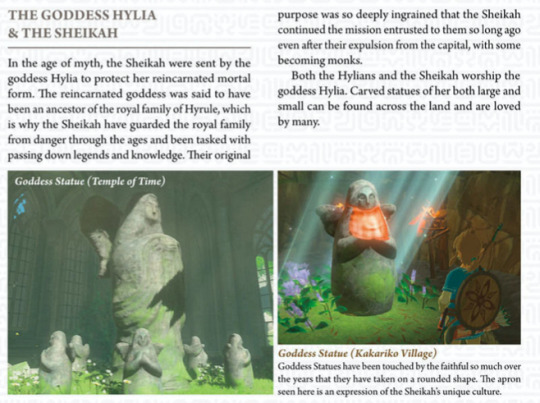
Source: Creating a Champion, p. 372
Now, the royal government using a minority group of people to do your dirty work is already scummy enough when you’re just a normal royal. In this case, however, the Sheikah are so devoted to their goddess that they will do anything for you. Whether it’s because certain monarchs are a “representation of a deity” remains to be seen, but the point is that they’ll do anything for you.
And the royal family takes complete advantage of a group of people unconditionally loyal to them, bidding them to do unspeakable things in the name of their religion, which for all intents and purposes is the royal family.
That’s absolutely deplorable, and it’s a wonder nobody’s brought attention to it yet, whether in-canon or in-fandom. What’s more, given how Impa is always Zelda’s attendant, this relationship is never questioned or criticized, whether it be by the Sheikah or Zelda herself.
And that’s terrifying.
- “The reason Ganon is always an antagonist is because he’s the vessel for the curse of Demise.”
Demise was introduced in Skyward Sword. Demise is the root of all evil, the creator of monsters and conjuror of demons. He is pure evil in every sense from the word, the Zelda series’ version of Satan. Naturally, he’s as simple as you can get in terms of character. Barebones characterization, providing only just enough to tell the player exactly what they need to know:
He’s evil, he’s powerful, and he wants the Triforce. You have to stop him.
Ganondorf existed before Demise. Ganon had over twenty years of development before Demise brought his progress to a permanent flatline.
Who was Ganon before Demise?
Allow me to remind you.
In The Legend of Zelda, first released on February 21st, 1986, Ganon is simply described as “the Prince of Darkness,” and steals the Triforce of Power when he invades Hyrule. After the Triforce of Wisdom is shattered, he kidnaps Zelda.
He’s evil, he’s powerful, and he wants the Triforce. You have to stop him.
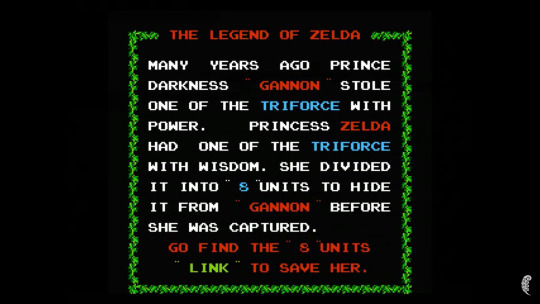
Although Ganon doesn’t physically appear in Zelda II: The Adventure of Link, released in 1987, his presence is still felt as his minions pursue Link in order to revive the Prince of Darkness. In fact, the game over screen is the successful revival of Ganon.

Now, given that these are the first two games in the series, it’s perfectly alright for Ganon to be as barebones as he was. After all, many villains at the time were the same way, with the most notable of Ganon’s counterparts being Bowser from the Super Mario Bros. franchise.
However, with innovation of technology comes innovation of narrative, and it’s with the release of A Link to the Past in 1993 on the SNES that we begin to see Ganon develop as a character. In the prologue to ALttP, Ganon is revealed to have once been human; he is given the name Mandrag Ganon—or Ganondorf Dragmire, as we now know him—and he was once the leader of a band of thieves who sieged the Sacred Realm and took control of the Triforce after murdering his own followers.
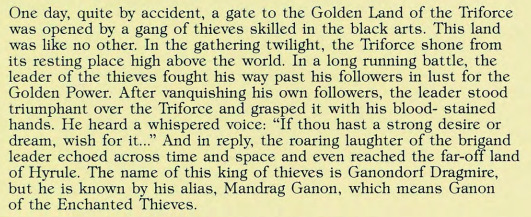


Source: A Link to the Past SNES game manual
Ganon is still irrevocably evil, but in this case, we begin to learn more about him. We begin to see a character starting to form. One who isn’t just mindlessly evil, but who has the charm and wit to infiltrate Hyrule Castle and earn the King of Hyrule’s trust in the guise of Agahnim. Ganon was also a very capable leader, having successfully led his band of thieves straight to the Triforce. Even after wishing upon the Triforce and corrupting the Sacred Realm, Ganon’s power attracted followers in the form of greedy, power-seeking people. He’s powerful not by brute force alone, but through his cunning use of intellect.
Ocarina of Time served to further develop Ganon in little ways. For example, this is the first game wherein, for the majority of the game, Ganon is seen and referred to by his human form: Ganondorf. Ganondorf is shown to be powerful enough and stealthy enough to infiltrate the homes of the Zora, the Gorons, and the Kokiri, and send dangerous hazards their way in an effort to seize the Spiritual Stones. At the same time, he is first seen at an audience with the King of Hyrule, as if there for diplomatic reasons.
Although Zelda sees Ganondorf as evil because of her prophetic dream, the King of Hyrule doesn’t believe her. Because of this, we can infer that Ganondorf has enough charm and charisma to, if not win over the King of Hyrule, not be seen as suspicious despite the horrible acts he’d committed, not just in the past, but at that very moment. He’s also shown to be highly cultured, shown at the end of Link’s ascent up Ganon’s Tower. Not only is Ganondorf playing his own theme, but he’s doing so on the pipe organ, which is notoriously one of, if not the most difficult musical instrument to master.
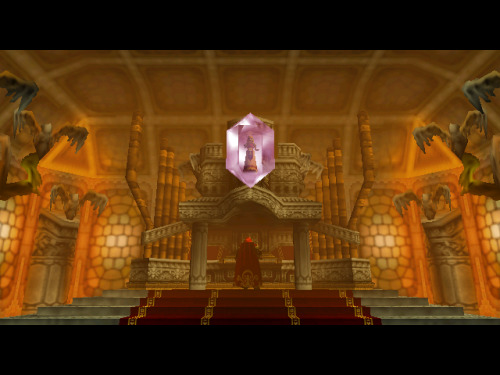
Once Ganondorf seizes the Triforce of Power, the kingdom of Hyrule is subjected to seven long years of his rule. During this time, normal people such as Ingo succumb to their greed and follow Ganondorf’s influence in pursuit of power and riches. Although Malon is naïve enough to believe Ingo was somehow under Ganondorf’s control, it’s clear to players that he was completely in control of his actions, and that Ganondorf’s rule brings out the worst in seemingly average people.
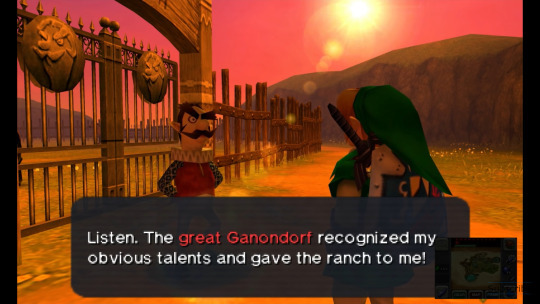
Image credit goes to YouTube user ZorZelda.
Even a Hylian knight can fall under this influence, with it highly inferred that the knight who once guarded a room of pots for Link to smash is now a twisted poe collector, the man even stating that he likes it better this way.
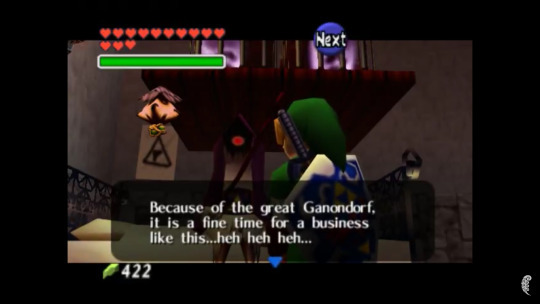
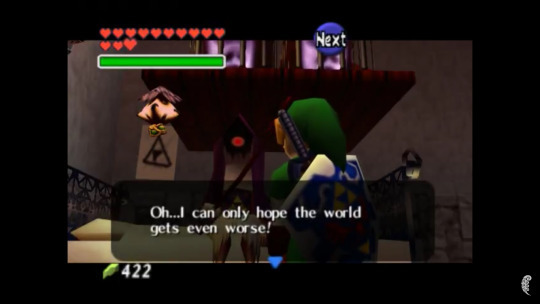
In Wind Waker, we finally see a more introspective side to Ganondorf. While he’s just as ruthless and fully ready to murder a child in the name of accomplishing his goal, he reveals the reason that started him on his path of darkness:
His people were suffering, and he wanted for his people what Hyrule had. He believed that taking Hyrule and taking the Triforce meant that his people could finally live freely, away from the harsh desert.
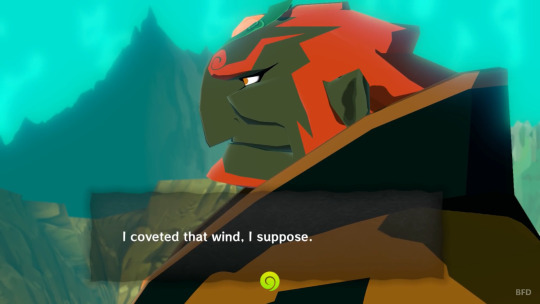
Now, I’ve seen this challenged time and time again. Was Ganondorf lying to distract or manipulate Link? Was he telling the truth? Is this what Ganondorf has convinced himself to believe, after so much time sealed away and in isolation? We will never know, and that’s part of what makes the game so interesting. Ganondorf’s portrayal is a large part of why so many people love Wind Waker, and it’s not hard to see why.
Perhaps the darkest the Zelda series has ever gone in terms of the Triforce’s power was in Twilight Princess. After freeing Lanayru, the Light Spirit warns Link of the dark power he seeks, the Fused Shadow. In order to do this, she explains the history of the Triforce, and the bloodshed brought by its allure to the darkness in the hearts of men. Before the construction of the Temple of Time, many battles were fought, and one of them was the “Interloper War” that inevitably resulted in the creation of, not only the Light Spirits, but the Twili and the Twilight Realm.
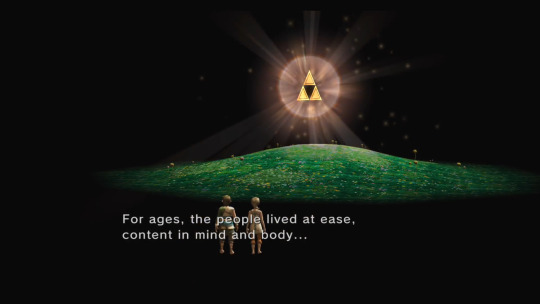

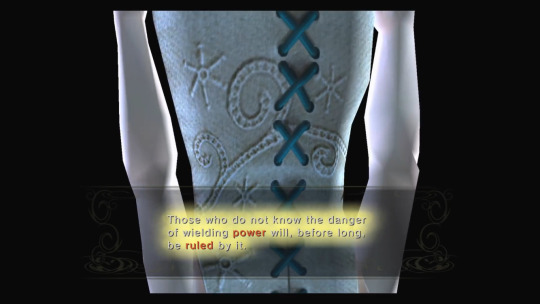
It’s important to note that Lanayru’s cautionary tale highlights that Link, the hero of the story, could succumb to the allure of the Triforce and dark magic just as easily as any other person. In this particular case, anyone could have fallen down the same path as Ganondorf. If anything, this tale is one of the most important bits of lore to take into consideration when discussing the series.
Anyone could have been in Ganondorf’s shoes. It could have happened to anyone.
Then, in one fell swoop, Skyward Sword ruined it.
In a single game, every bit of progress on Ganondorf is lost. Once again, we’re dragged down to the baseline characterization from the original game.
He’s evil, he’s powerful, and he wants the Triforce. You have to stop him.
Suddenly, everything the previous games had built up no longer matters. There’s no longer a need to question whether what Ganondorf did was solely out of greed, but also out of what he felt was necessity. There’s no need to wonder if Ganondorf was once a rational man, who succumbed to the irresistible pull of the Triforce like so many before him.
Ganondorf is, purely and simply, the reincarnation of Satan, so there’s no need to go any deeper than that.
And that’s why I hate this “vessel of Demise” thing. It completely undermines everything Ganondorf once was and reduces him to a single, cardboard cutout of a villain.
Moving on, before I get sad.
- “This curse is specifically tied to Hylia’s bloodline and the Link’s soul, which is pretty specific…”
Demise’s curse is essentially dooming the earth with a never-ending rebirth of his hatred; his malice, if you would. The wording of his curse is specifically “people like you,” which could mean that it isn’t Link and Zelda’s exact souls that are tied to his hatred. Rather, people possessing the blood of the goddess and a heroic, courageous soul are doomed to deal with this curse.
However, my thoughts on this matter are pure speculation.
Also, Demise specifically targets his curse at people like Link and Zelda because they were the ones to kill him in the first place. That much is obvious.
- “… [So] why do the clashes with Ganon always throw the fate of Hyrule into disarray? Because Zelda’s bloodline runs the country.”
Ganon would attack Hyrule even without Zelda’s family in charge. His pursuit of power and domination of the Triforce/Hyrule is therefore closely tied with the fate of Hyrule. Goddess blood on the throne has nothing to do with it.
- “If Zelda came from a small town the curse would probably manifest in peril for that one region which isn’t great but it’s better than an apocalypse.”
Firstly, this is a run-on sentence. Secondly, I reiterate: Ganon would attack Hyrule as a whole, regardless if Zelda’s bloodline was on the throne. It wouldn’t matter if Zelda’s whole family suddenly moved to the countryside. When Ganon inevitably comes back, he’s still gonna go straight for the Triforce or to conquer all of Hyrule. Goddess blood isn’t even part of the equation for Ganon. And if goddess blood isn’t there to stop him, then that’s even better.
Alright, so I’m not even going to bother gratifying the last two paragraphs of the response with an answer, because it’s all rambling that has nothing to do with the original argument. Relinquishing the throne would do nothing to right any wrongs dealt to the many people who were hurt, and evil doesn’t care about a single princess with goddess blood or a boy with a pointy stick.
In conclusion, the addition of Hylia made it so that the royal family’s power dynamic with the Sheikah is even more critically imbalanced than it originally was, making the exile of the Sheikah 10,000 years ago even more heinous than it originally was. Yet, because Hylia is portrayed as wholly good and incapable of doing wrong, despite in-game evidence to the contrary, the royal family, and Zelda by extension, will never be criticized for any wrongdoing. In fact, doing so may well be heresy, if the responses to my original post are anything to go by.
By comparison, the addition of Demise diminishes Ganondorf’s character, rendering him down from the makings of a complex, human character—where anyone could have easily been in his place and had the same greed and ambition for power—into simply the reincarnation of the literal devil, where of course he’s evil, and you don’t have to do any digging beneath the surface. Ganondorf is the reincarnation of Demise, or his hate, or his vessel, so he’s pure evil and nothing more.
And that’s the greatest disservice Nintendo has ever dealt to The Legend of Zelda.
#legend of zelda#ganondorf#princess zelda#breath of the wild#botw#loz#tloz#ocarina of time#twilight princess#zelda#link to the past#alttp#wind waker#ganon#the legend of zelda#hylia#goddess hylia#demise
46 notes
·
View notes
Text
Who Is Your Main Character, Anyway?
Over the last six months, I have noticed a recurring problem in every fiction manuscript I’ve edited and a few other nonfiction projects to boot. It’s a problem that’s both made editing significantly more difficult than the task otherwise might be and it’s killed all of these potentially entertaining novels dead, so permit me to ask you a question:
Who is your main character?
No, really. I’m serious. Do you know who your MC is? Can you point at a single character and definitively say, “Yes, this is my MC”?
If not, you—and your story—might be in trouble.
For reference’s sake, some of the novels I’ve edited since June 2019 include:
A collection of sci-fi short stories tied together with alternating chapters of an extremely and alarmingly abstract, philosophical variety
A contemporary novel revolving around health problems, corrupt management, and struggling teachers in a NYC school
A contemporary novel set in a heavenly courtroom that functioned as a soapbox for the author’s opinions on the current state of the US government
An urban fantasy set in modern-day NYC with trolls, fairies, dragons, and other fantastical beasts
I also edited a memoir about life in Crete during WWII that was told via a progressing series of anecdotes.
All five of these projects, which sound so different from the outside, share the same issue: The author didn’t understand the need for a main character.
But why is a main character important? In fact, isn’t it possible to have more than one MC? I hear the arguments: the MCU doesn’t have a single MC, and look at how utterly lucrative that series has been.
Fair point, and I’ll touch on multi-POV later, but for now, bear with me and treat the idea of a main character as one of the fundamental storytelling rules. And like all rules related to writing, you need to know how it works before you can effectively break it.
So what is a main character?
The typical main character in a novel is, at their very core, the character who both:
Has the highest stakes in the story’s climax
Goes through the most dramatic change themselves (positive/negative arc), or has the most dramatic change on the world around them (flat arc)
If either element is missing from the character, chances are they aren’t actually the MC.
Why is this important?
It’s important because if you don’t consciously determine who your MC is, you’re far more likely to be swayed by other characters who pop up and their respective stories. Suddenly one character has severe anxiety due to a crummy upbringing and all but vanishes after they begin recovering after a failed suicide attempt. Another is stealing medication from the locked nurse’s office to deal with a problem that isn’t quite important enough to actually receive mention in the novel. Yet another character becomes a mouthpiece for a topic the author is passionate about but doesn’t actually tie into the novel’s plot or theme. Suddenly there are characters crawling out of the woodwork, all interesting and unique and playing important enough roles that the author becomes distracted with the shiny and the tantalizing and doesn’t quite realize that they’ve completely failed to mention a character isn’t a human at all and indeed is a troll until page seventy-three. Oh, and there’s no climax to the novel either. Huh. How did that happen?
One consequence of an author failing to identify their main character is that failing to do so often leads to an unfocused story. POVs hop from character A to character B to character C to character D, and somehow we find ourselves at character M before finally circling back around to character A, whose story... I no longer quite remember—or care about, because character G was fascinating and I want to get back to them.
Another consequence is that POV oftentimes is distributed unevenly throughout the story. A concurrent issue I’ve noticed cropping up is the use of omniscient POV in these troubled manuscripts. While that’s a topic for another post, I will say that a lack of main character + omniscient POV = stories that are notoriously difficult to edit effectively because it’s one thick layer of confusion on top of another thick layer of confusion. Trying to determine what the authors want out of those stories requires a frankly outrageous amount of effort compared to a story with a single main character and a limited POV because the editor has to spend so much time and energy guessing what the author truly wants.
On top of that, I’m going to take a wild guess and say that most authors don’t want to tell an unfocused story. Sure, we might want to obscure some facts, might want to leave the occasional little mystery for the reader to enjoy puzzling out, but we want our writing to be understood. We want it to resonate. And it’s difficult for a story to resonate when half its notes are atonal and the other half are outright missing.
Step 1 is to identify who your main character is. Step 2 is to determine what characters are masquerading—temporarily or completely—as the main character. In the contemporary novel set in the school I mentioned above, there were at least eight initial contenders for the role of main character, all with their own unique stories and all with significant POV time, but only one character had any bearing on the climax, and it was a character who didn’t appear until almost a third of the way into the novel but got less POV time than several other characters. This doesn’t work.
This doesn’t work because the reader assumes, particularly in genre novels (excepting romance), that:
the first character we meet, and
the character whose POV opens the novel
is going to be the main character. This isn’t a hard-and-fast rule, and there are absolutely exceptions—such as The Great Gatsby, in which the MC and the narrator are two totally separate characters—but this post is about identifying MCs in particular. Narrator vs MC is a topic for another day.
(In conventional romance novels, the POV is split fifty-fifty between the two love interests. This post doesn’t really apply to conventional romance, but it’s still not a bad idea to check yourself once in a while to make sure you don’t have any characters who are trying to worm their way into being the MC when they shouldn’t be.)
Some of the problems I’ve encountered in the five projects I mentioned above include:
A POV that skitters from character to character, even to characters who have no arc or bearing on the overall plot whatsoever
An unfocused climax or a total lack of climax
Numerous subplots that never resolve and/or never have any bearing on the climax
Significantly lowered chances that the reader will bond with or care about any of the characters
Unsatisfying character arcs and/or plots
Plots that wander to places they never should have gone
Subplots of subplots that have nothing to do with the main character and/or climax at all
Painfully boring scenes that serve no purpose
The author bending the characters and plot to A Message rather than allowing either to exist naturally
The author not understanding what is truly important or interesting in their story
Stories that try to cram way too much information into a single book
The exclusion of details that are vital to understanding the overall story
Before throwing the unfinished book aside, the reader asking the two deadliest possible questions: So what? and Who cares?
That’s a rather terrible and terrifying list, isn’t it? All because each author never chose a single main character for their novel.
So I ask again: Who is your main character? Are they present from as close to the beginning of the story to as close to the end of the story as possible? Are they the most changed (or do they cause the most change around them) of all the characters in the story? Are there other characters around them who have plots or subplots that don’t tie into either the climax or the main character in any way? Is there another character who has more of an effect on the climax than your current labeled MC? More POV time or overall focus?
If you don’t have a main character to anchor your story around, the chances of it wandering, drifting away on every little eddying breeze that comes along, stumbling into dead ends and boring climaxes and unsatisfying character arcs grow with each added word. So challenge yourself to nail down a single main character. Wrap the entire plot around them, tight enough to choke them if you must. Get your facts straight; tie every detail back to them. You might find extraneous loose threads you can pluck out, be they characters or plot elements—but you might also find areas that are weak and need building up. You might even find both coexisting in the same story, because writing is sometimes just like that.
And once you know how to identify and use your main character, you can begin adding other elements to your story, elements that can create a bit of breathing room wherever necessary, all without the story losing its focus or meandering away from you into an area that leaves your reader—or editor—baffled at best, furious at worst.
That said, of course it’s possible to have more than one MC, but with each MC you add to a single novel, the more work you’re creating for yourself, because each MC needs to have equal stakes in the climax and, preferably, an equal amount of attention throughout the story. Conventional romance, with its lack of a single MC, works because the climax hinges on the two characters who have received equal attention (via POV time and word count) up to that point. They both stand to win—and lose—the same thing, namely their mutual happy ending. Adding in a third main character is possible but tricky. Four? If you can do it, you’re a better plotter than me, friend, and I salute you.
A note: yes, subplots are a great way of adding extra characters or situations to a story that don’t necessarily run through the main plot. Ideally, though, most subplots should be resolved as close to the climax as possible to give the entire climax that added oomph. Again, there are exceptions, and it’s often a per-story situation, but a story can only handle so many notes being played before the sound of it gets muddy. Plot accordingly, and don’t lose sight of who the main character is.
Another note: yes, the MCU doesn’t have a single main character. Even some of the MCU films don’t have a single main character, particularly the Avengers flicks, and discussing how to handle a story that has multiple MCs is not really what I wanted to focus on today. Summarized, those stories are possible but tricky. Please notice the way very few of the MCU main characters get introduced in the big team-up films. Most of the characters get their own films or get introduced as side characters in those films so the audience has to do less work initially investing in them when there is more than one main character present.
496 notes
·
View notes